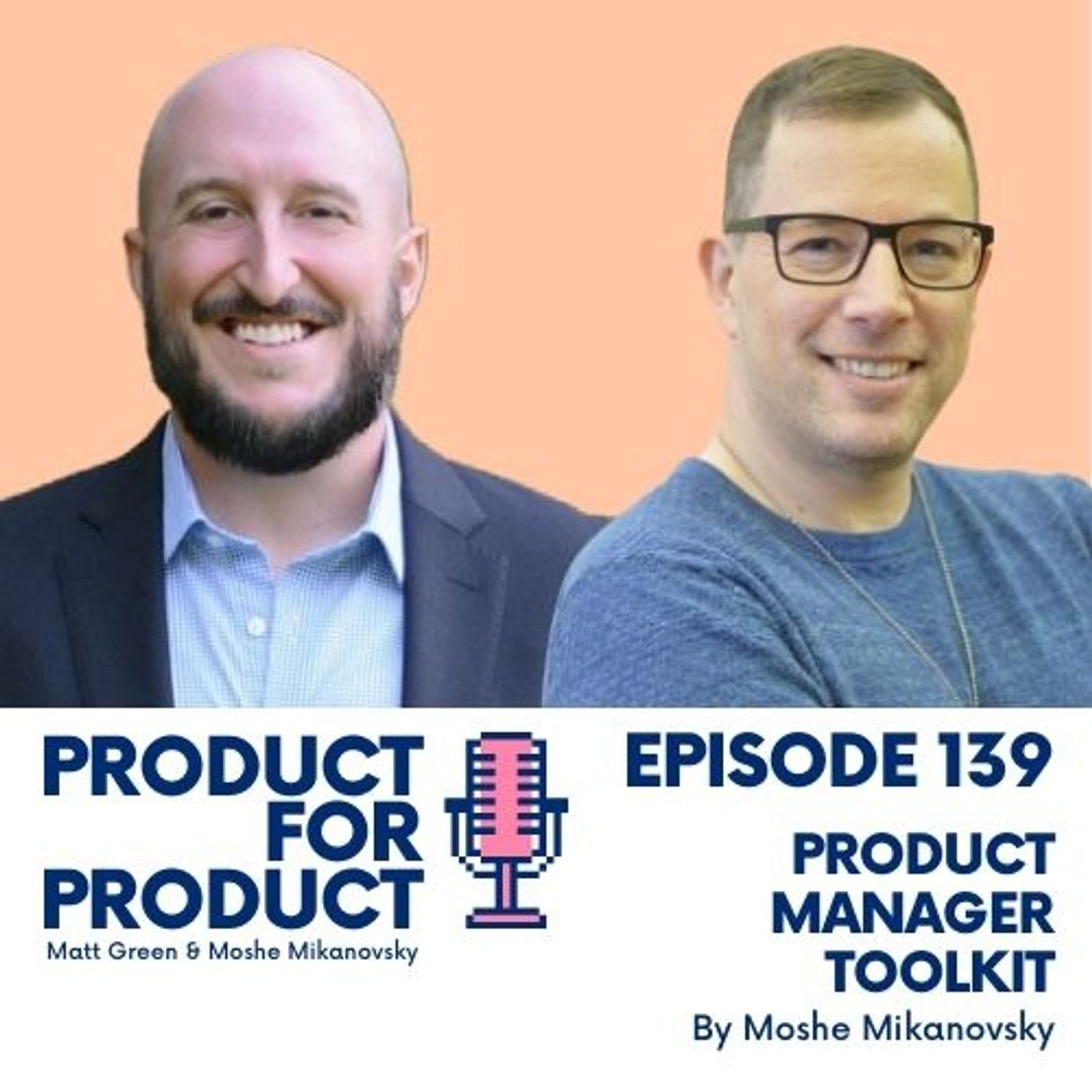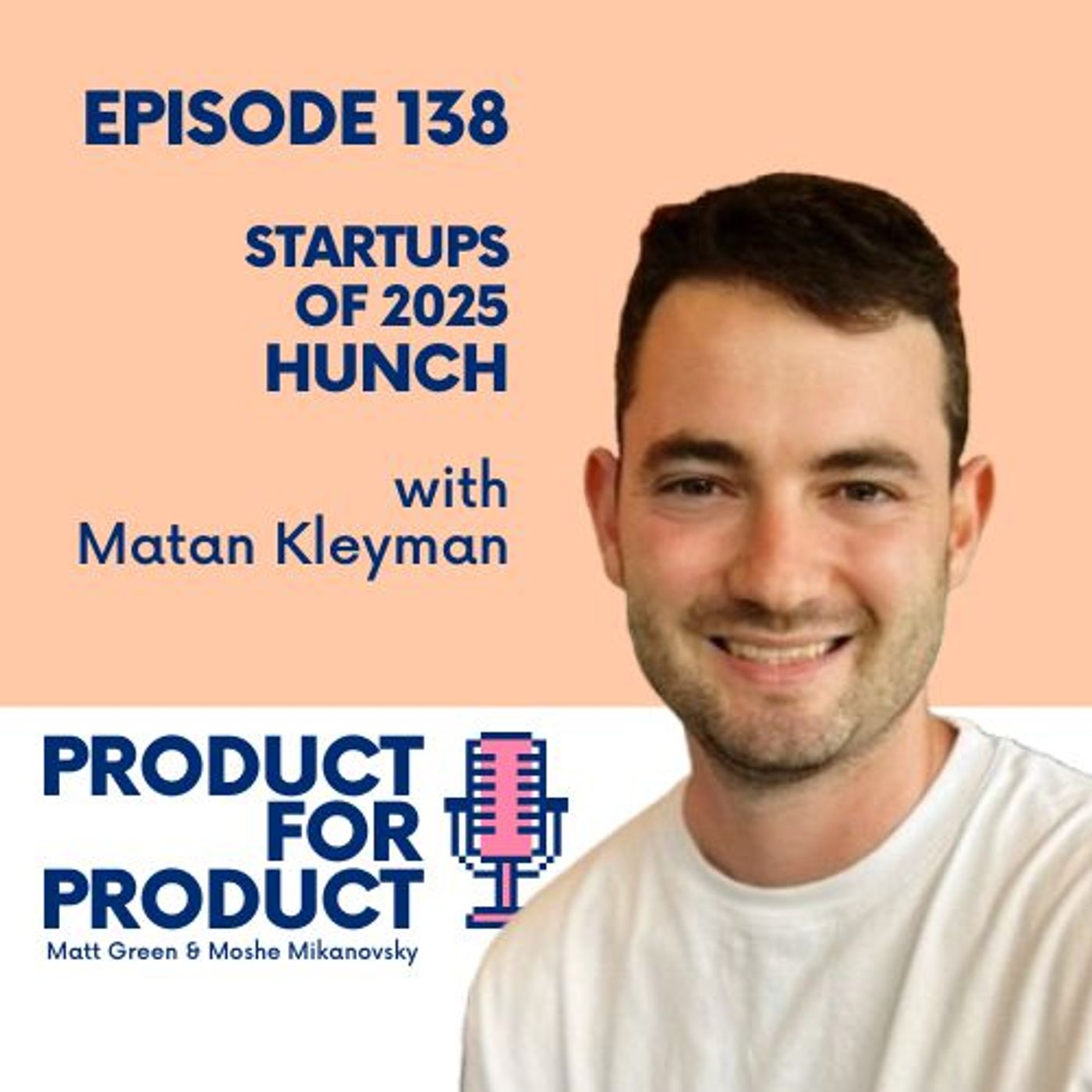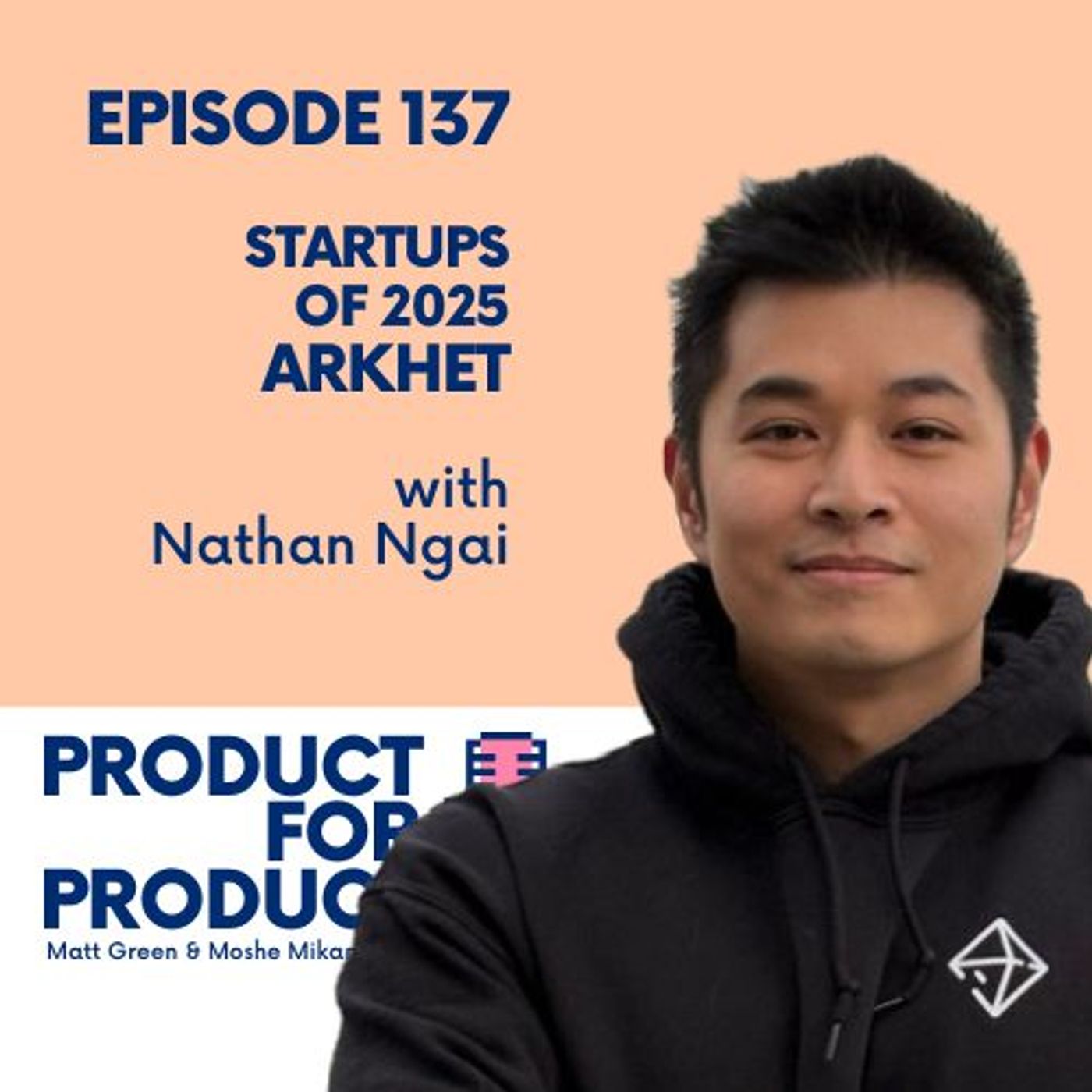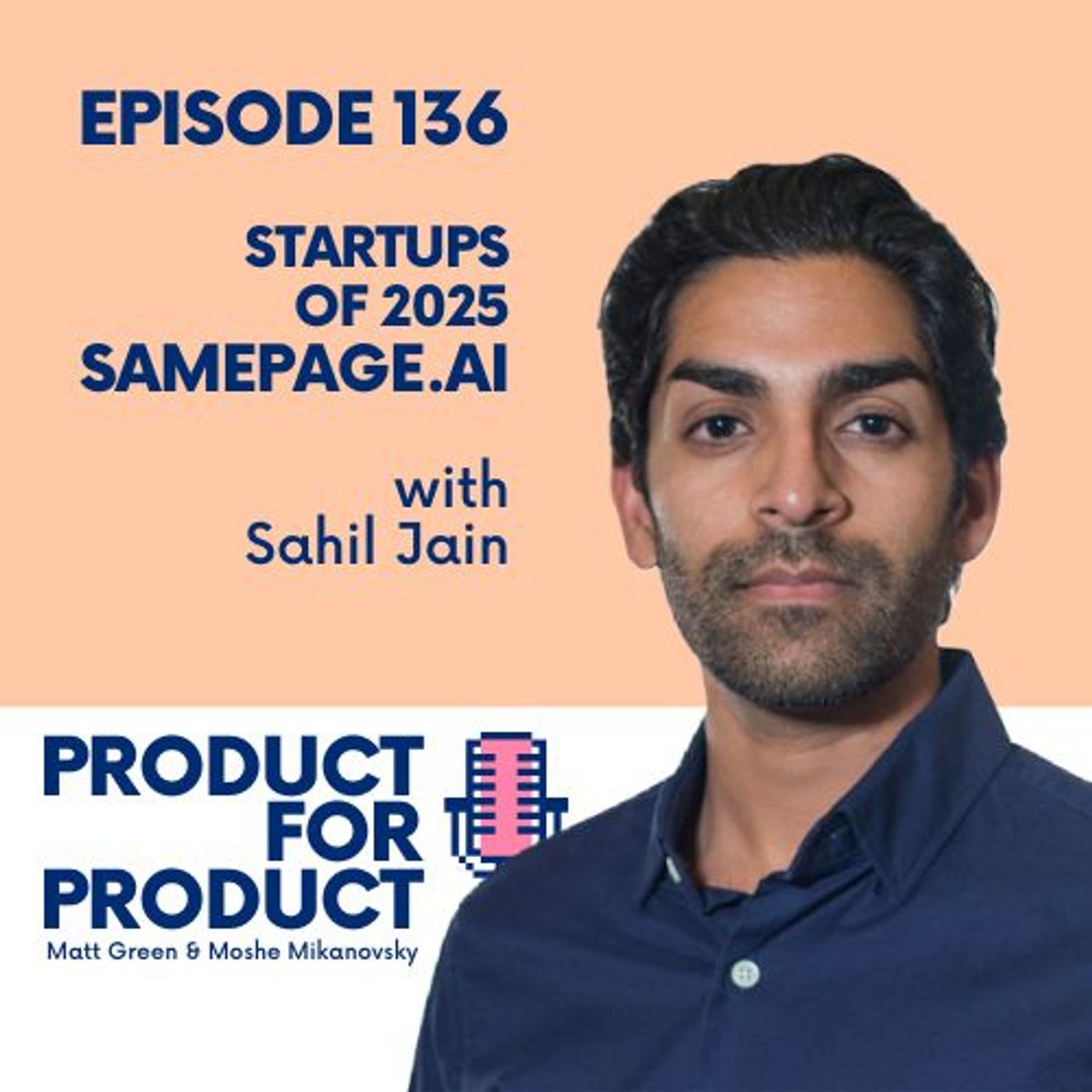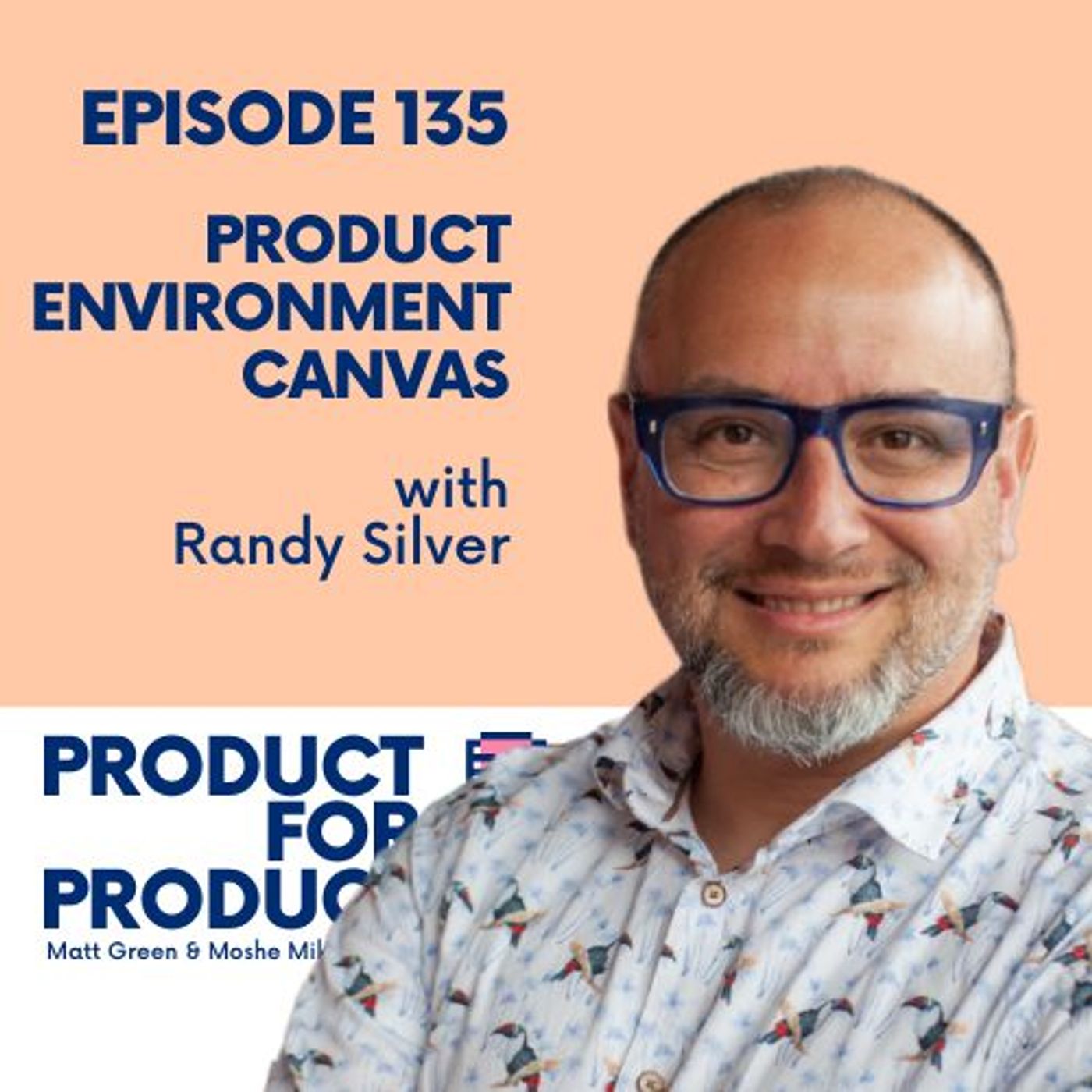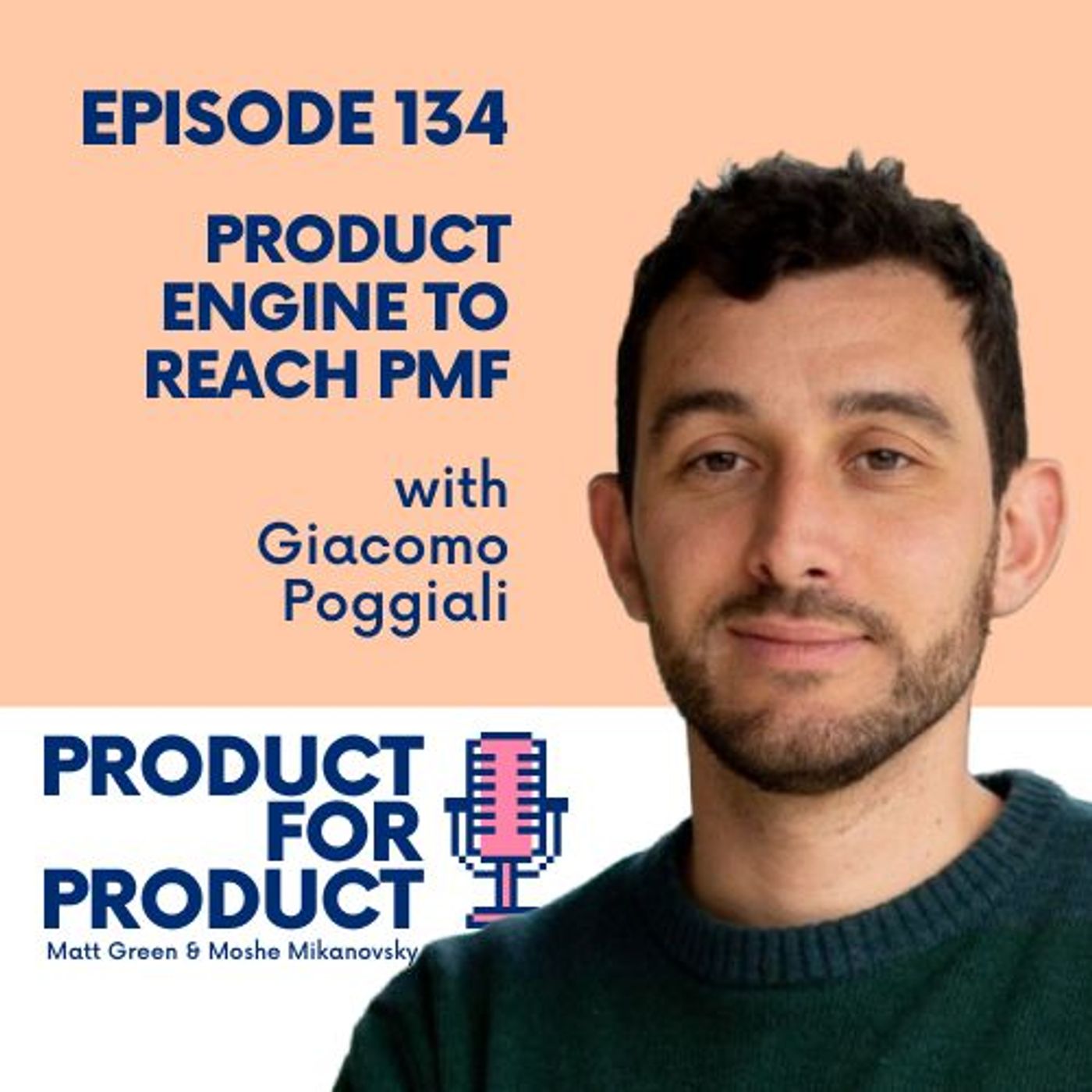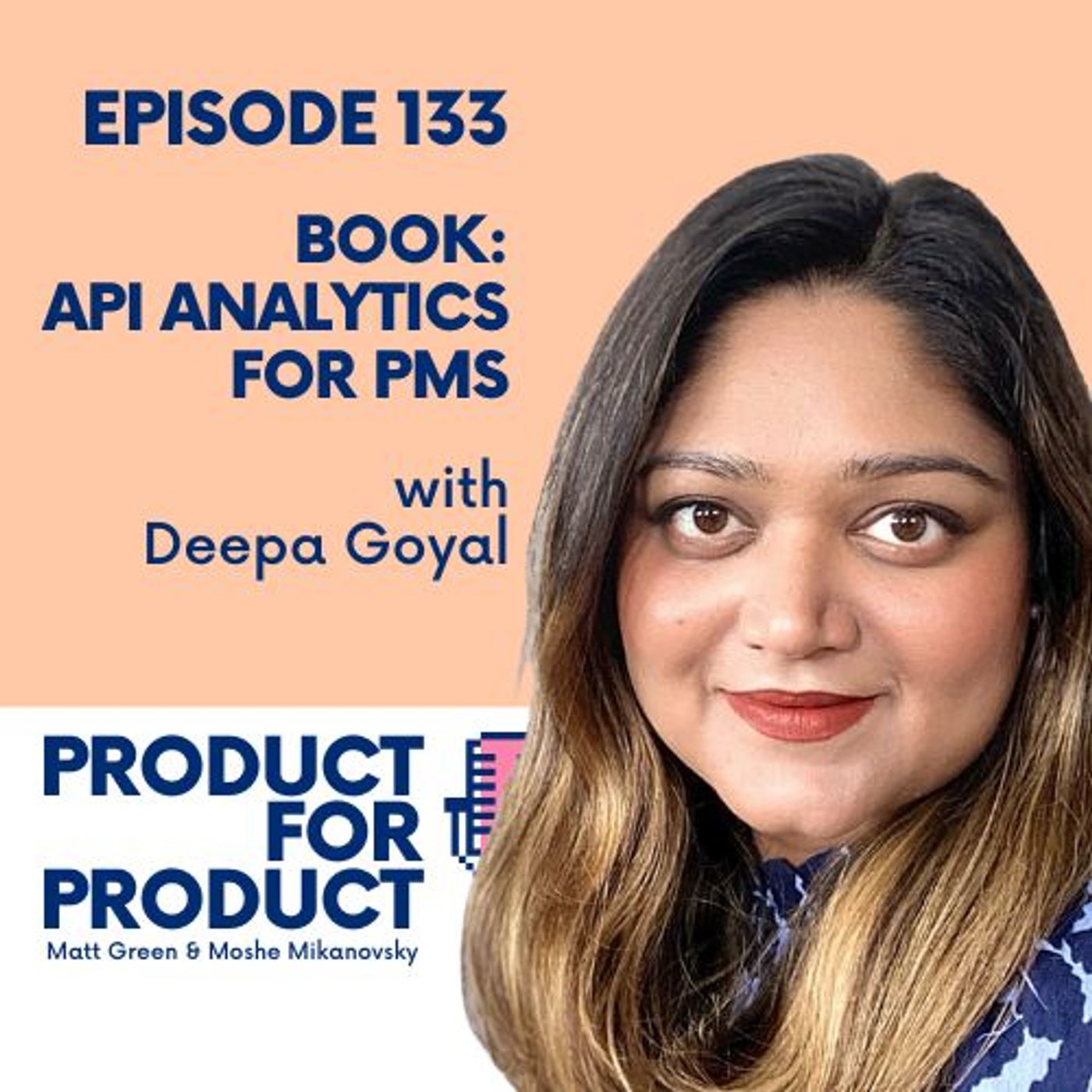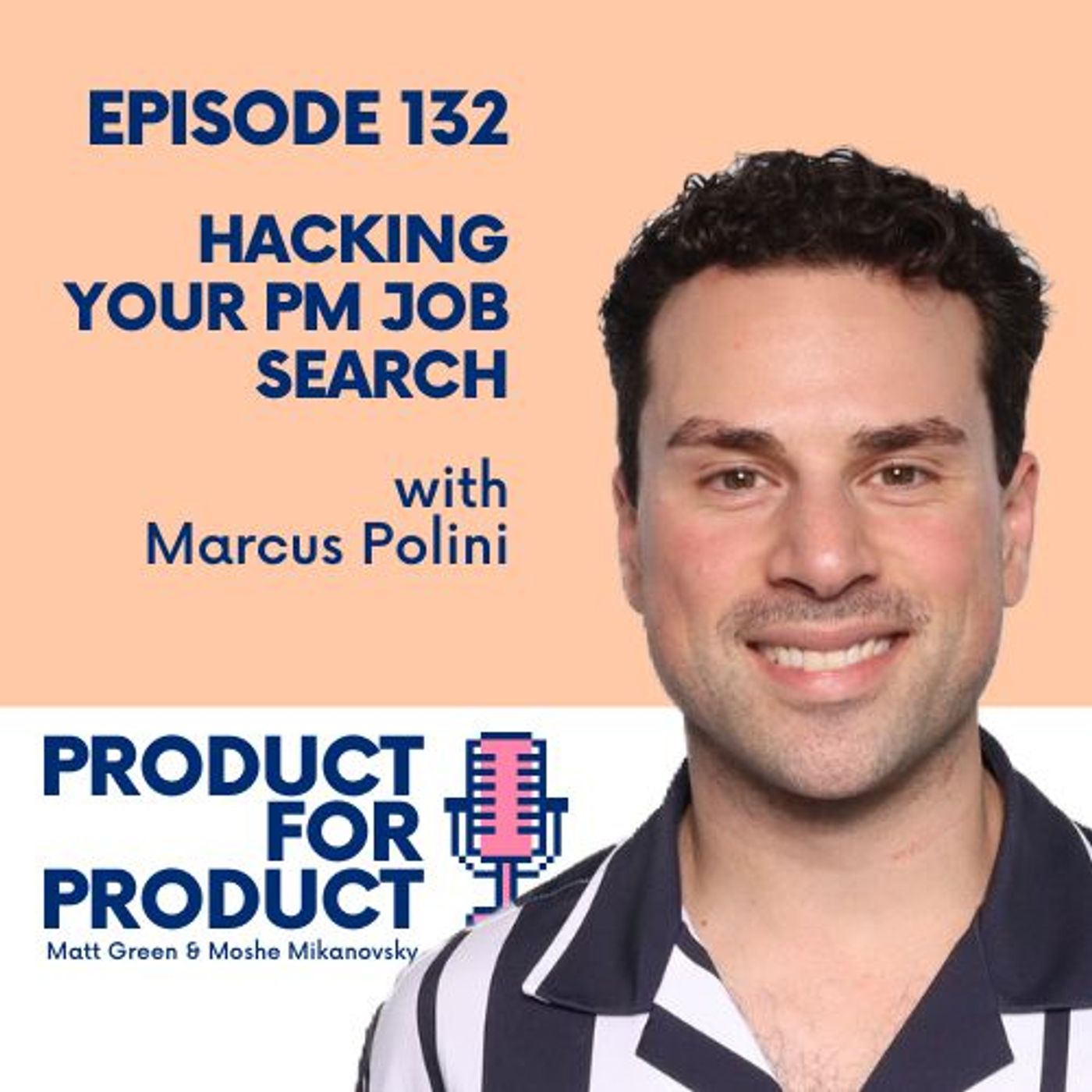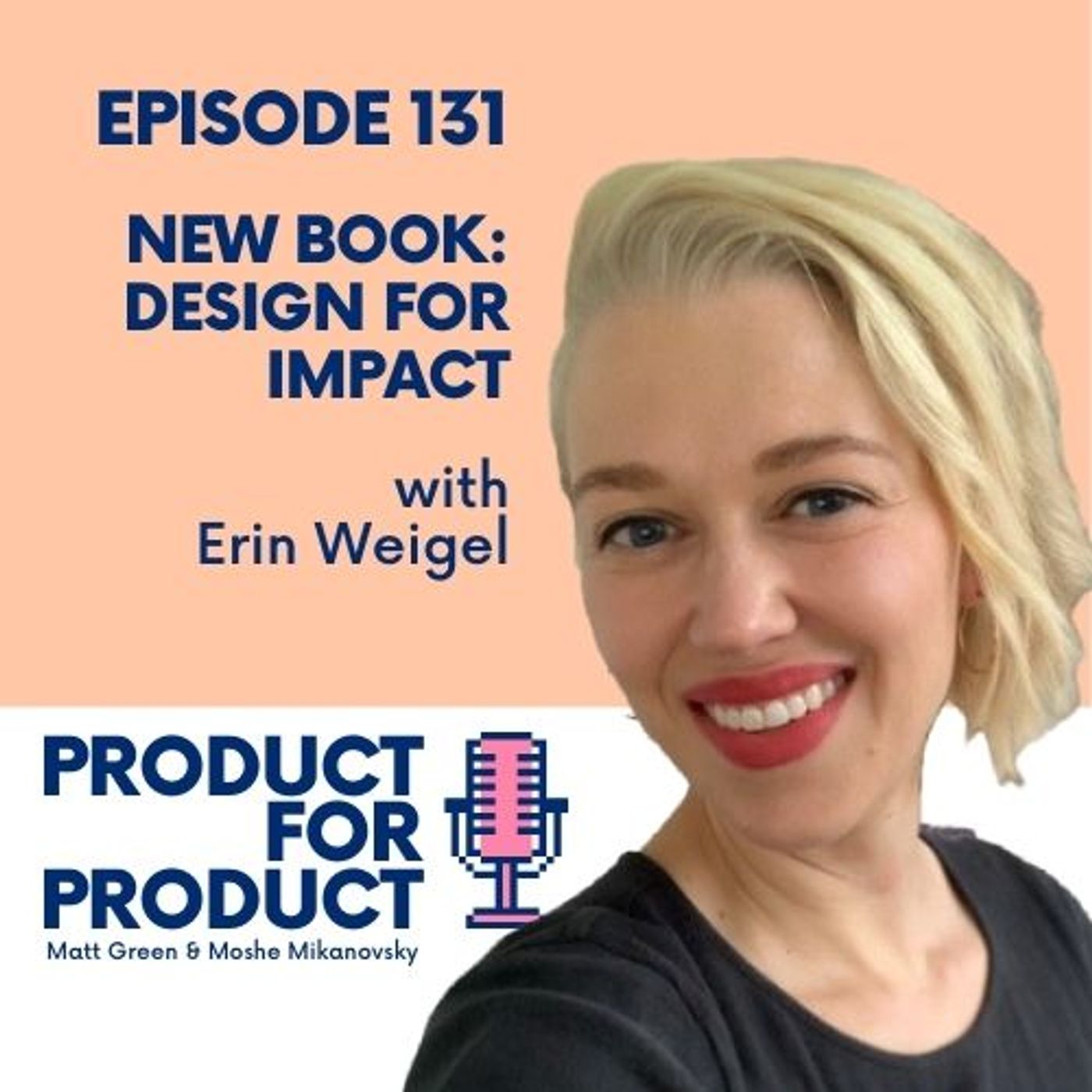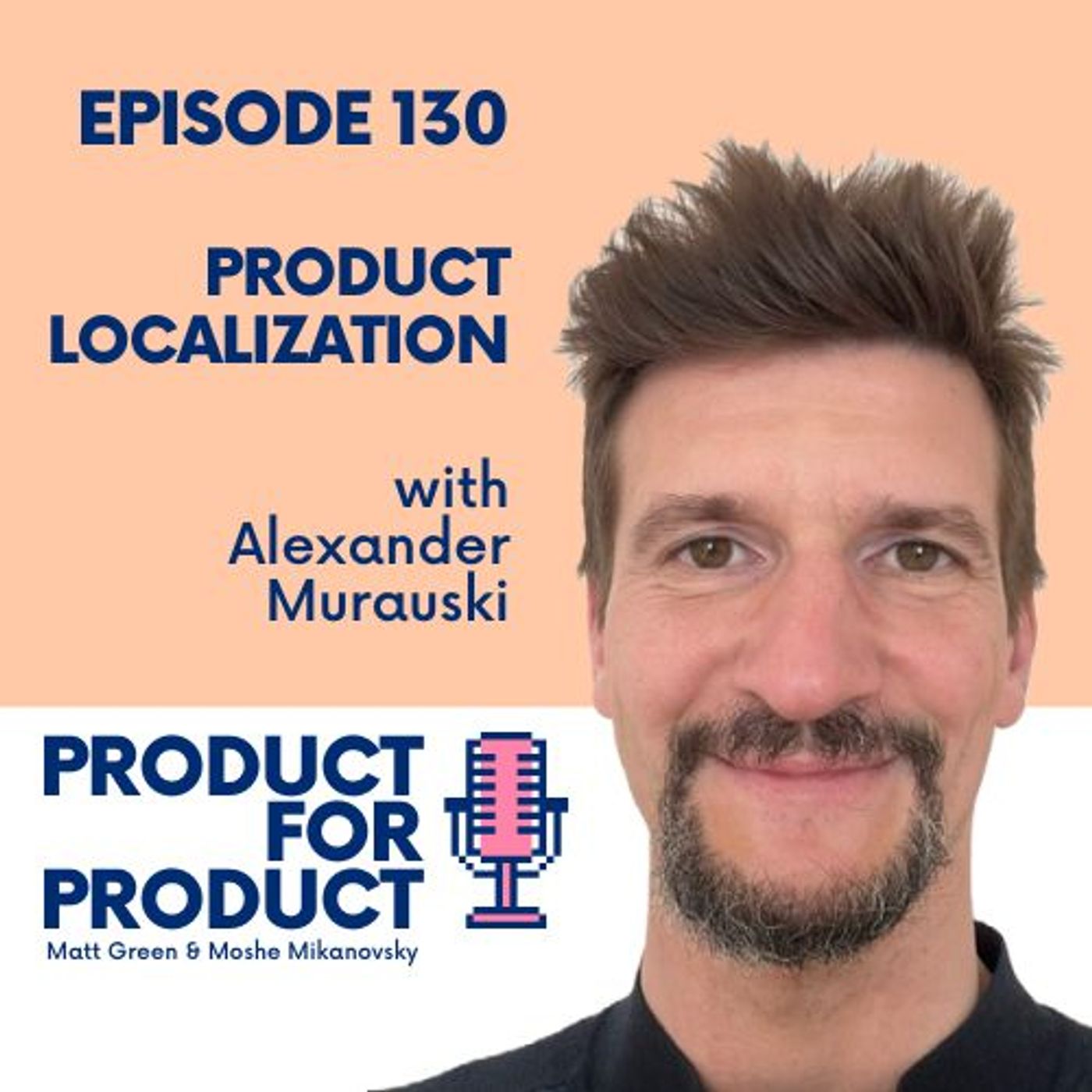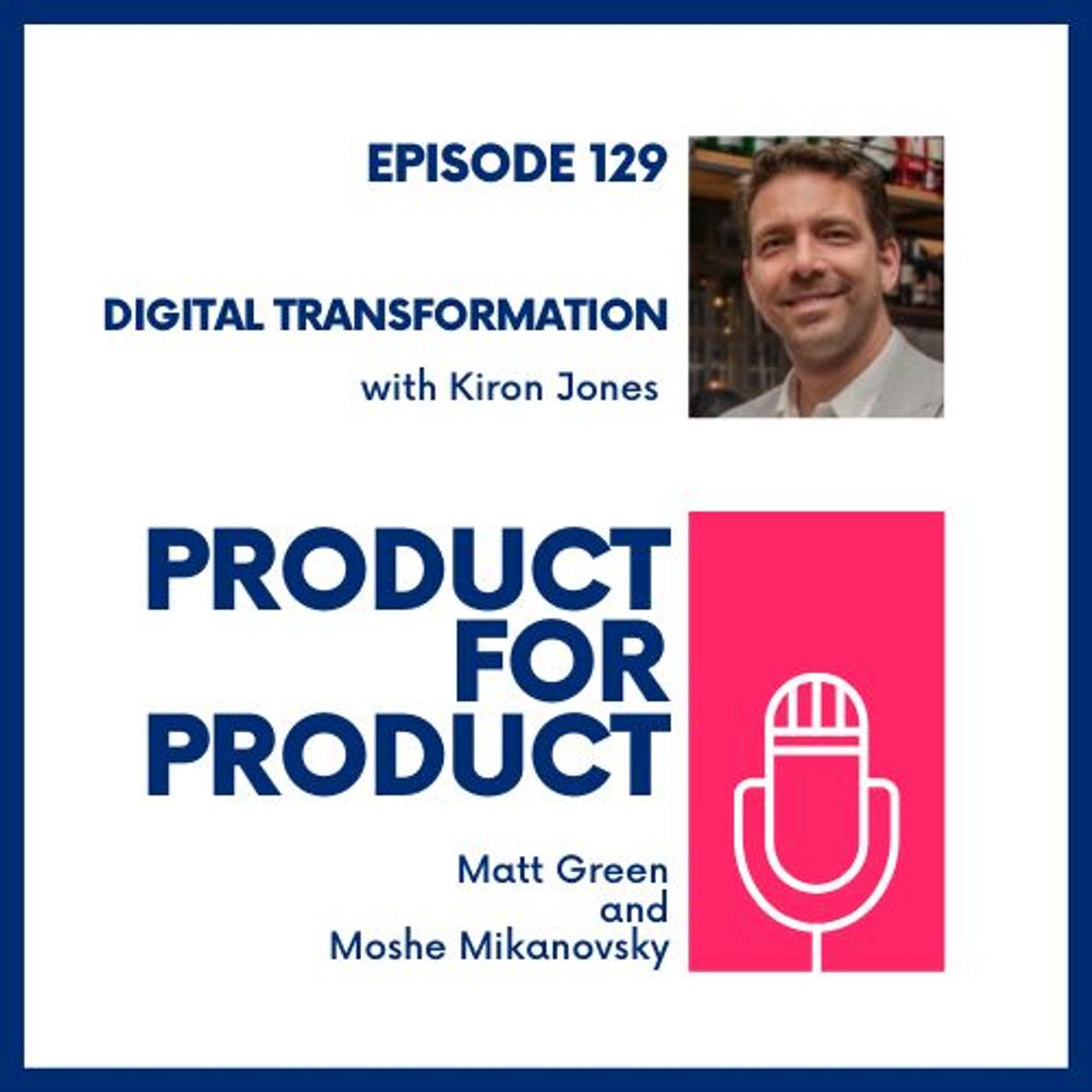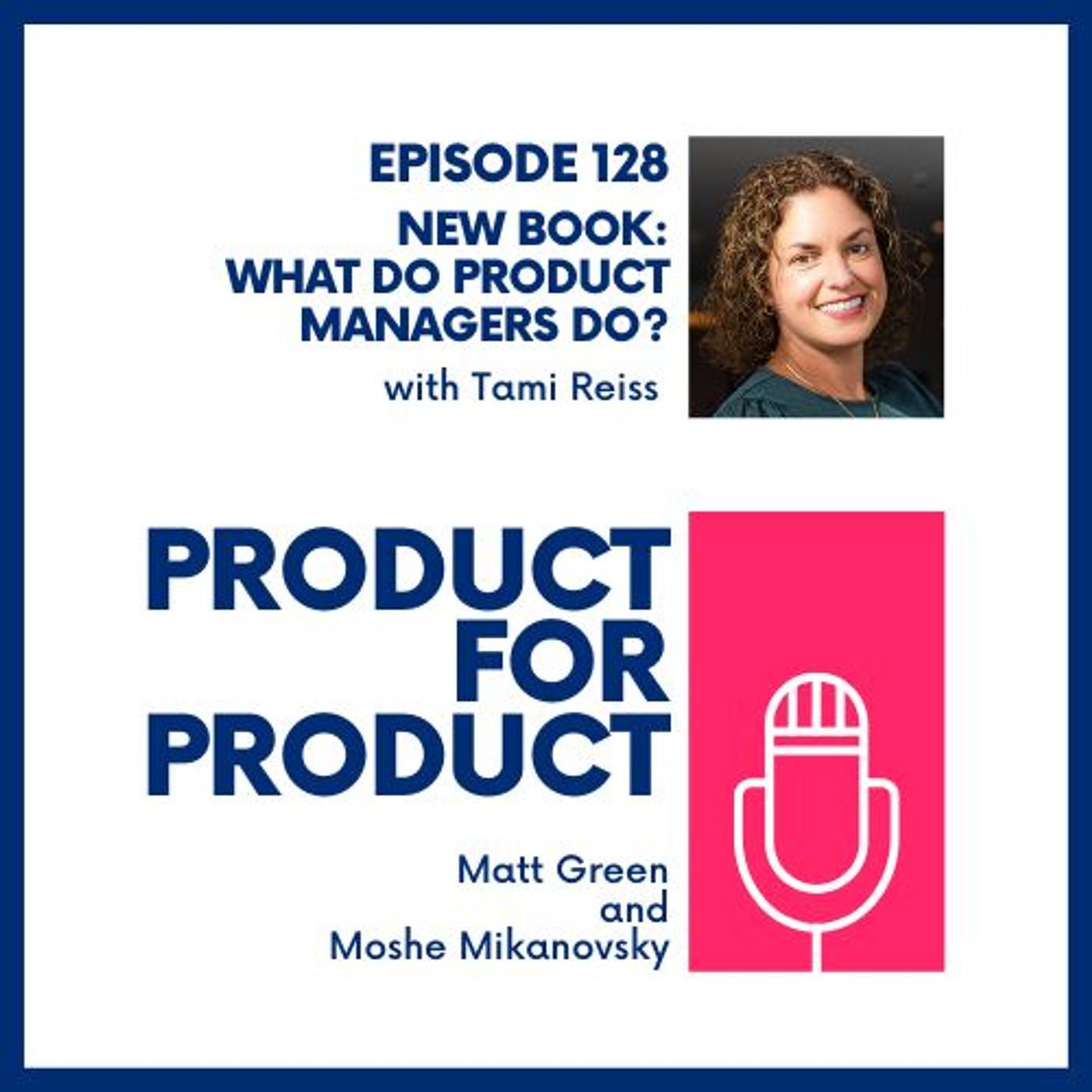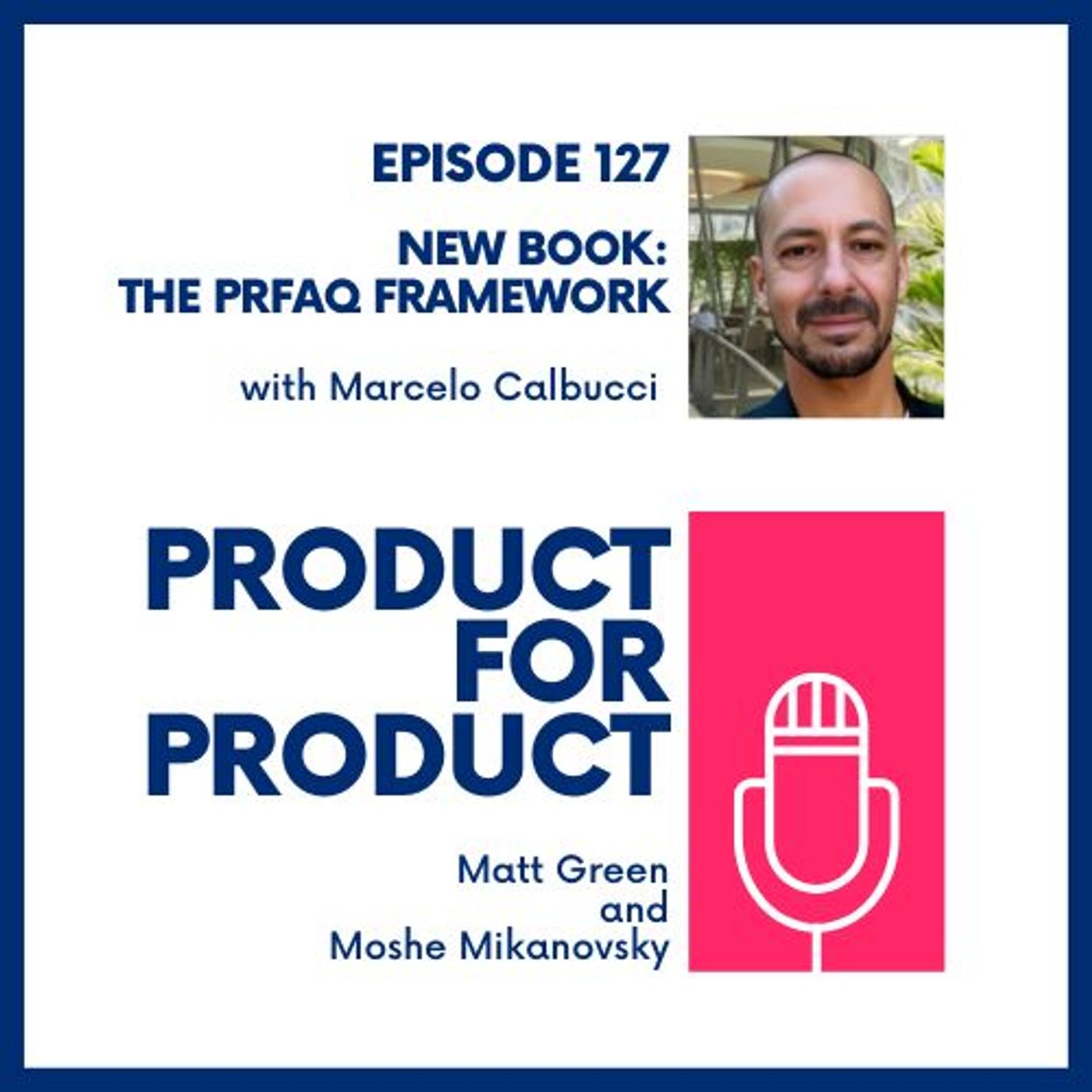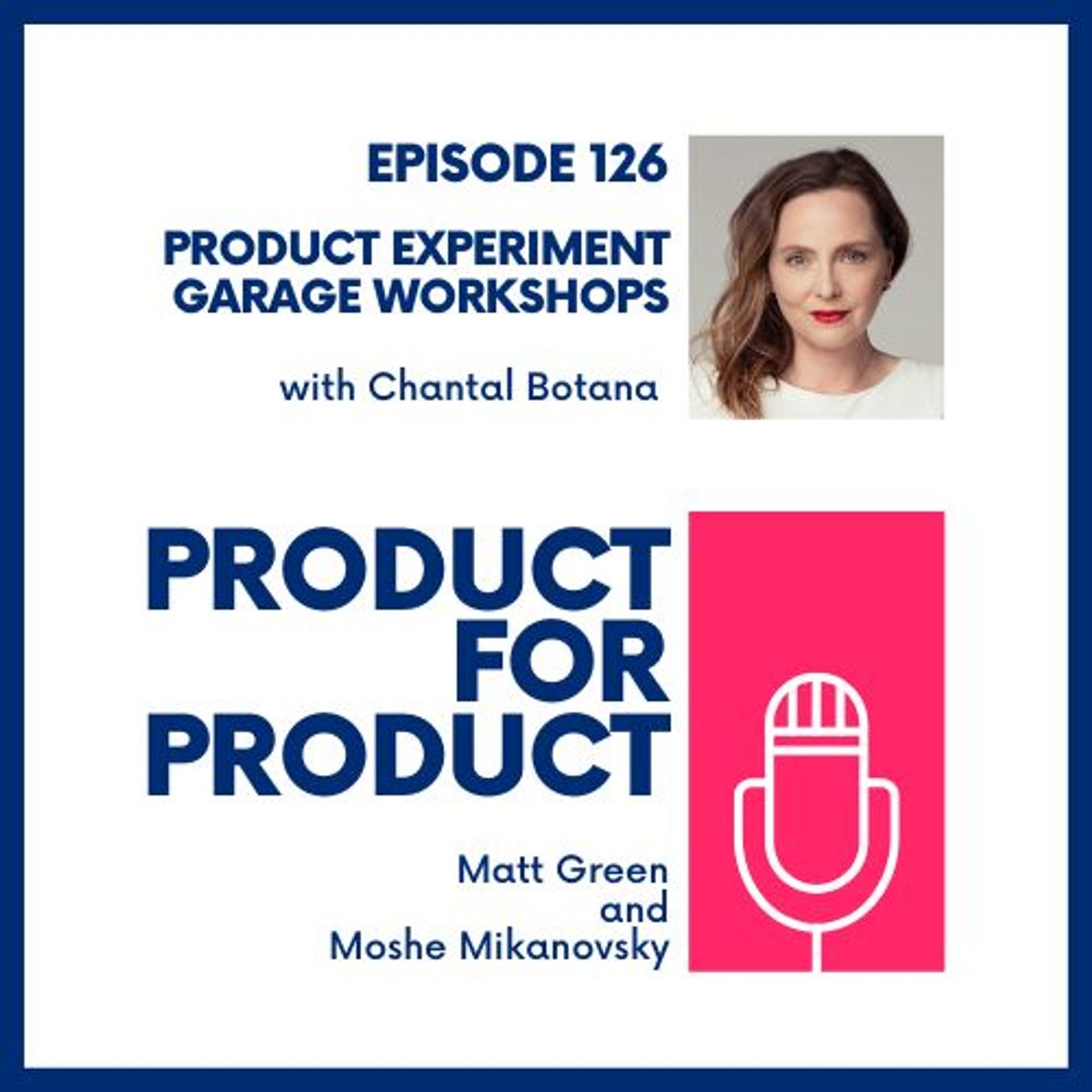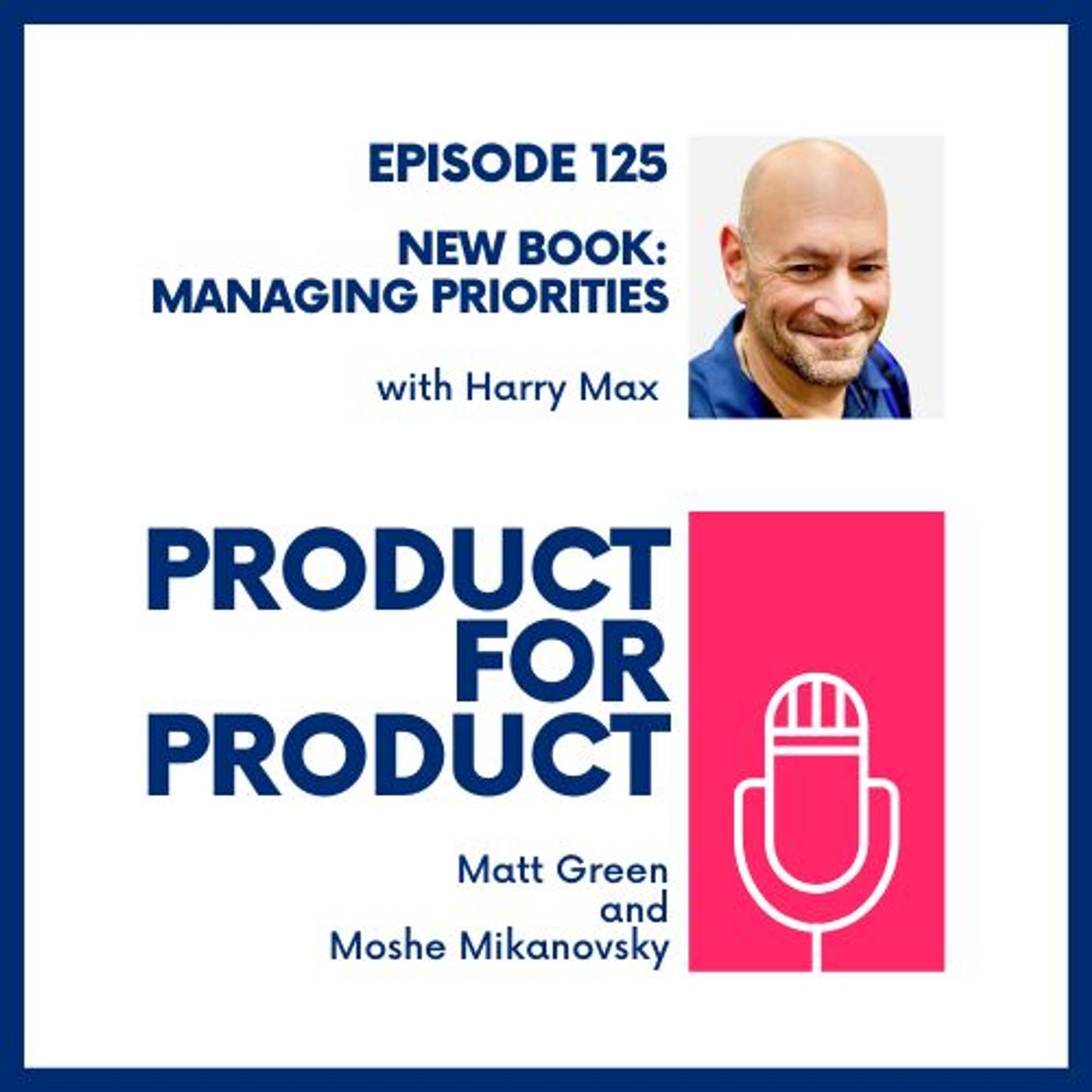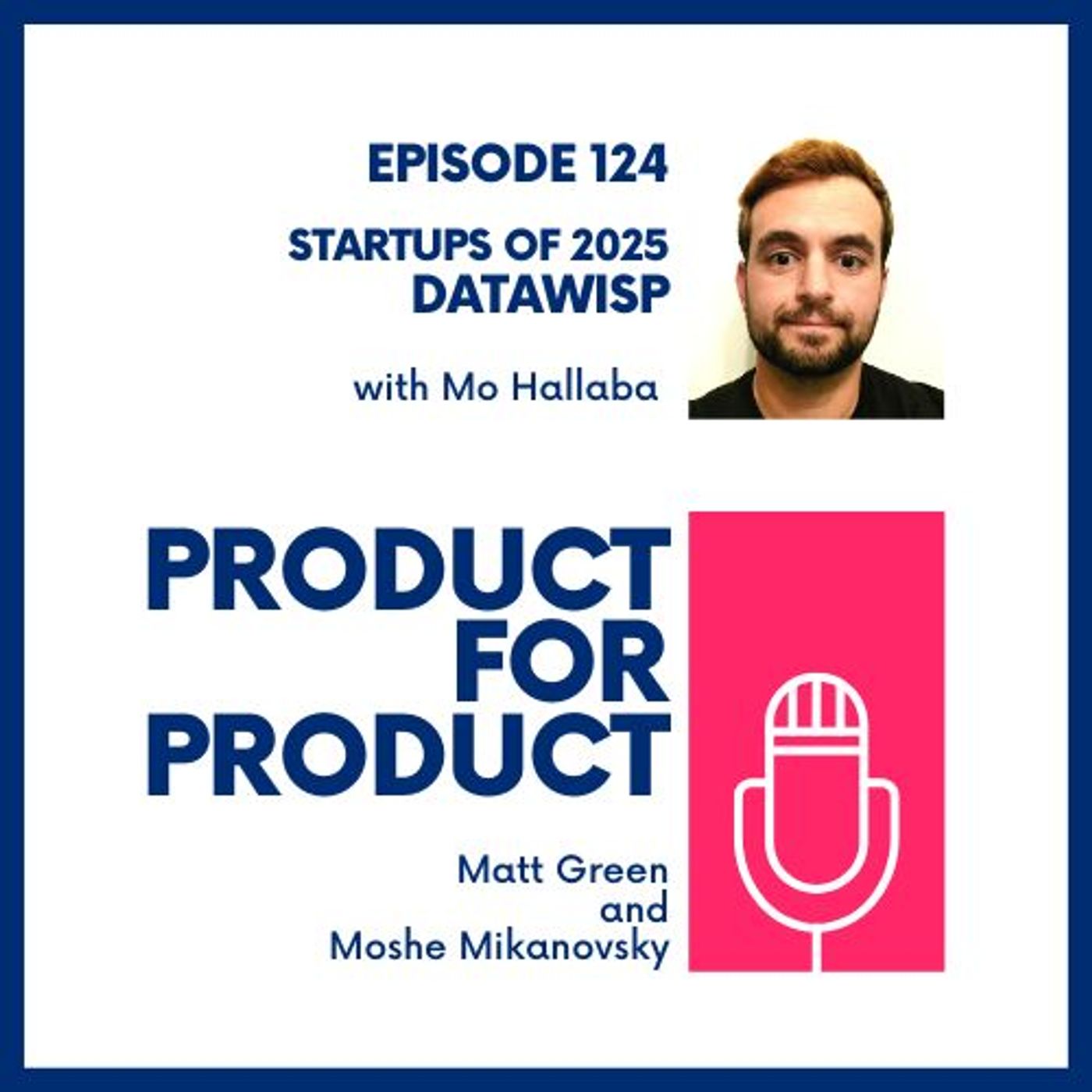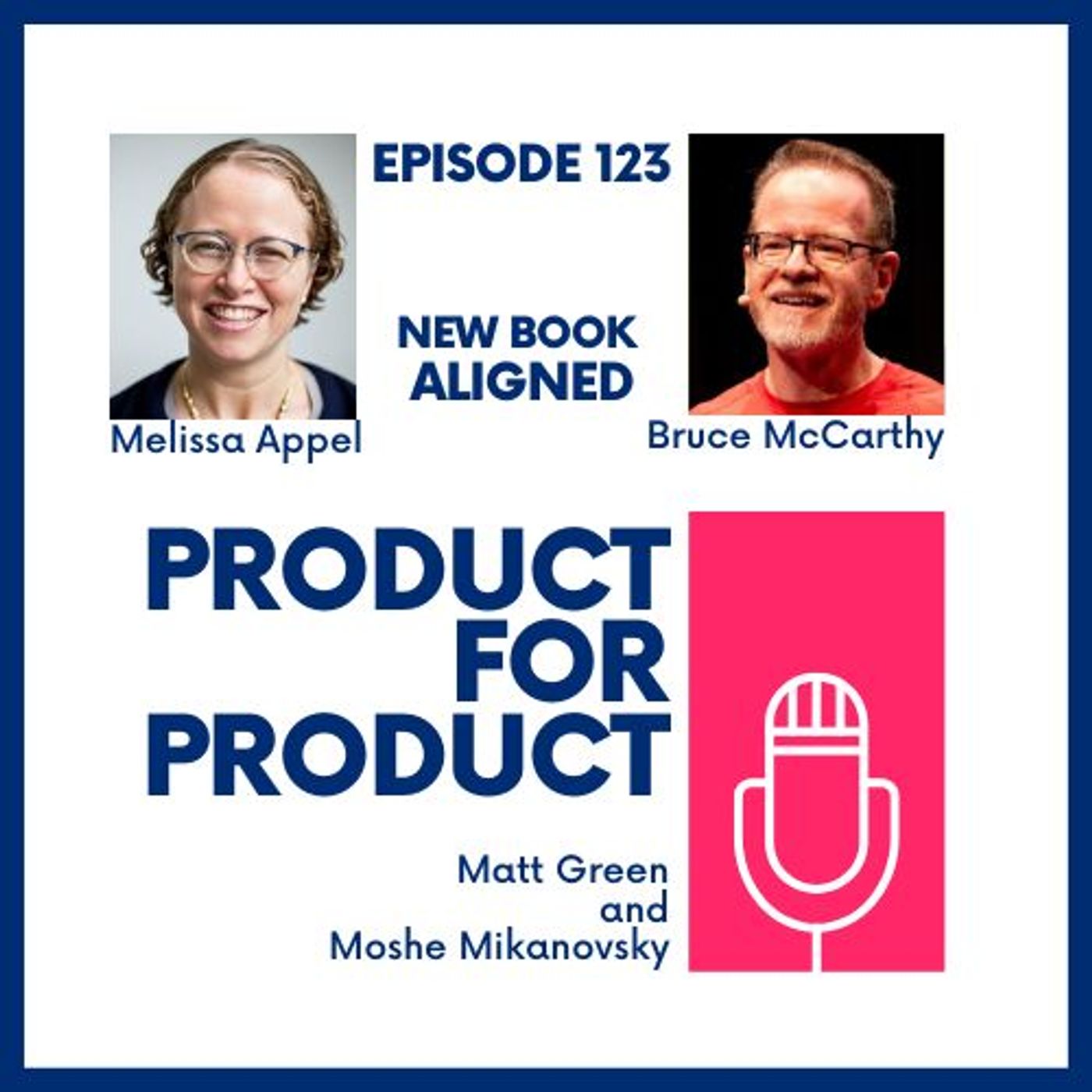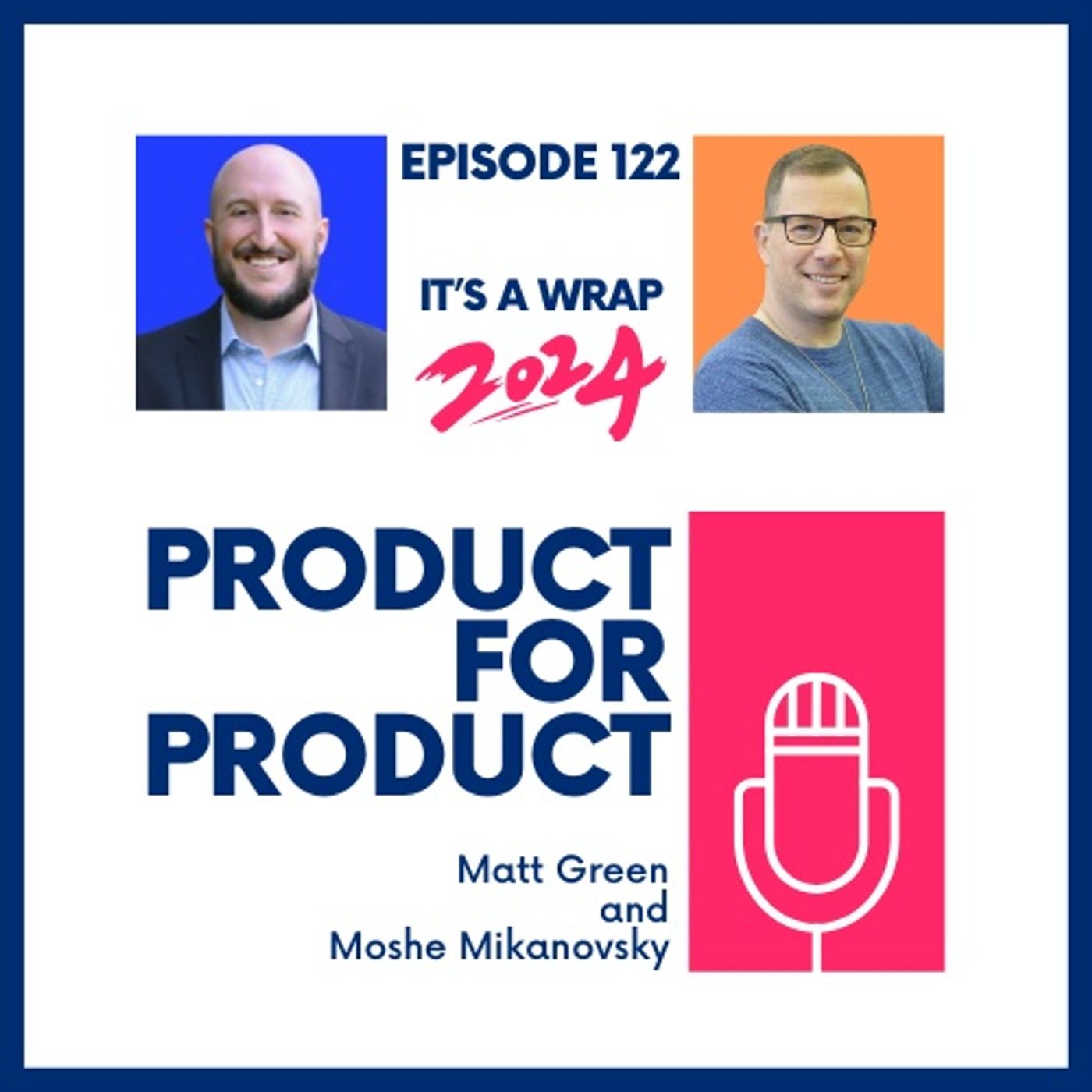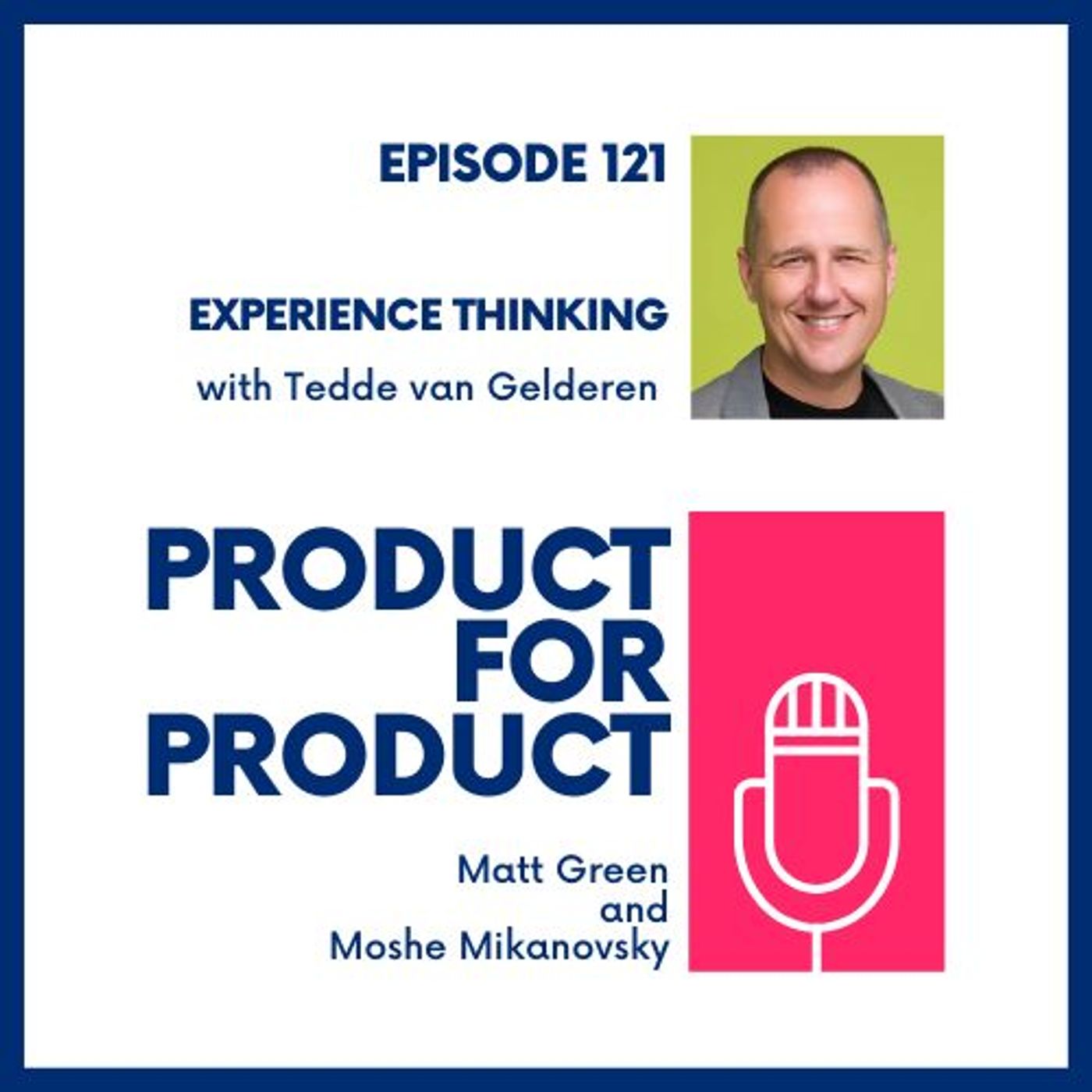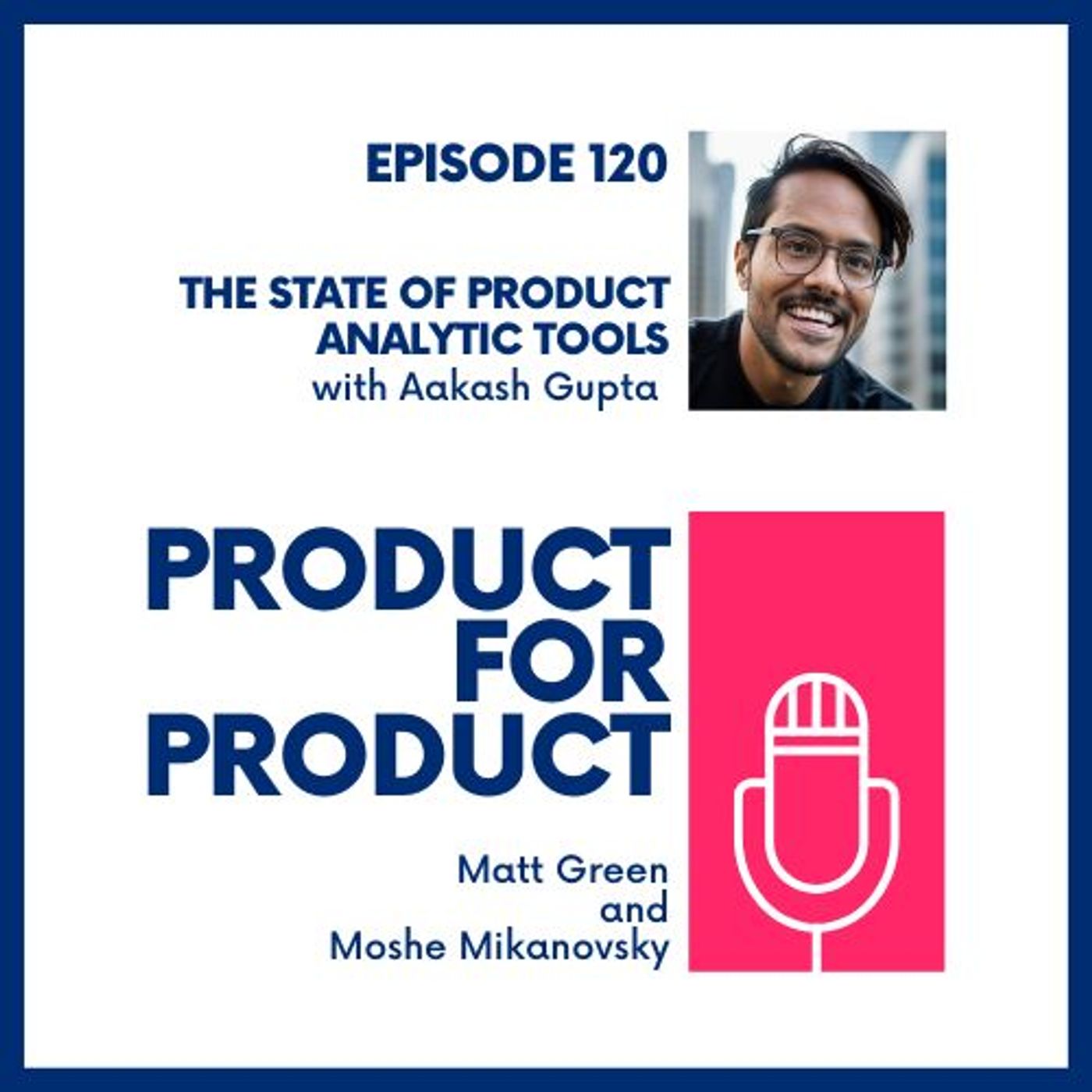Discover Product for Product Management
Product for Product Management

 Product for Product Management
Product for Product Management
Author: Matt Green & Moshe Mikanovsky
Subscribed: 73Played: 930Subscribe
Share
© Copyright Matt Green & Moshe Mikanovsky
Description
Product for Product is a show hosted by Matt Green and Moshe Mikanovsky aimed at helping listeners navigate the growing depth of product management tools while also providing our insights into the categories that make up the PM role. We will take listeners with us on a journey of discovery through areas of product analytics, road mapping, productivity and many others. If you want to keep up with the latest in product management come along for the ride!
Connect with us on LinkedIn:
https://linkedin.com/in/mattgreenproduct
https://linkedin.com/in/mikanovsky
Connect with us on Youtube:
https://www.youtube.com/@productforproduct
Connect with us on LinkedIn:
https://linkedin.com/in/mattgreenproduct
https://linkedin.com/in/mikanovsky
Connect with us on Youtube:
https://www.youtube.com/@productforproduct
140 Episodes
Reverse
As part of our ongoing effort to equip product professionals with the best frameworks and resources, this episode takes a different turn. Moshe steps up as the main speaker to introduce the Product Manager Toolkit, a comprehensive framework he created to help product managers select and implement tools more efficiently and strategically.On the show, Moshe walks Matt through the toolkit live using Miro, highlighting how it’s designed around the very principles they’ve discussed with guests throughout the history of the podcast. Now published as a template in Miroverse (with nearly 1,000 views and 44 copies!), the toolkit is freely available for product people everywhere. Moshe shares its origin, core components, and how it’s become a valuable resource for teams mapping out their needs in today’s dynamic product landscape. Join Matt and Moshe as they explore:The end-to-end workflow for product tool selection, from identifying needs and prioritizing requirements to shortlisting, testing, and implementing solutionsA visual ecosystem diagram capturing the full product management cycle, including ideation, strategy, delivery, and ongoing monitoringThe Product Manager Tool Mapping Template, guiding PMs to connect needs with tool options, while considering organization size, culture, maturity, and budgetInsights on the interconnectedness of modern product tools and prioritizing tasks by urgency and importanceThe ever-evolving list of 150+ product management tools on Airtable and the challenge of keeping resource lists up-to-datePractical product selection criteria, including wide vs. deep tools, entry-level vs. advanced features, integration requirements, AI support, vendor reliability, and customer supportThe importance of defining success criteria, creating rigorous test cases, and assessing support and long-term costs before making a commitmentWhy it’s crucial to evaluate not just features and price, but factors like company culture, scalability, and support processesMoshe’s vision for a book focused on tool selection frameworks - if you think it’s a good idea, let him know!And much more!Ready to streamline your approach to tool selection? Access the Miroverse Product Manager Toolkit template, share your feedback, and join the conversation!You can find the toolkit and connect with Moshe at:Product Manager Toolkit Miroverse Template Products for Good: productsforgood.co LinkedIn: Moshe MikanovskyAnd don’t forget to connect with Matt and the podcast:Product for Product PodcastMatt GreenNote: Any views mentioned in the podcast are the sole views of our hosts and guests, and do not represent the products mentioned in any way.Please leave us a review and feedback ⭐️⭐️⭐️⭐️⭐️
As we continue our tradition of highlighting innovative startups building for product professionals, we’re excited to introduce Matan Kleyman, CEO and Co-Founder of Hunch, on this week’s episode.On the show, Matan shares his journey from technical engineering and data science roles to leading product teams and hosting a podcast focused on AI and product management. Now with Hunch, he’s set out to solve a problem many product managers know well: after all the investment in collecting and aggregating data, only a handful of senior data engineers truly know how to use it.With that problem in mind, Hunch is on a mission to democratize data access, giving product people rapid, autonomous, and approachable ways to get insights, act on their hunches, and unlock value from their company’s data.Join Matt and Moshe as they explore with Matan:The founding story of Hunch and why product managers are at the center of their visionHow Hunch enables any team member to query data using a ChatGPT-like interface and ready-made templatesTurning raw insights into dashboards and customizable data apps with no technical background requiredHunch’s two big differentiators: optimizing for speed and for true autonomyReal-world use cases, from engineers and PMs, to data-driven decision-making in actionHow Hunch supports both quantitative (what happened in the product) and qualitative (what should happen next) analysis, including transcript integrationsMatan’s philosophy on building trust: prioritizing transparency over rigid accuracy and giving users control over contextBest practices for onboarding, context management, and building knowledge sets in HunchLessons from building their public roadmap and belief in open, user-driven product developmentThe future of product management as a hybrid of visionary leadership and orchestrationAnd much more!Curious to try Hunch or learn more? Connect with Matan:LinkedIn: https://www.linkedin.com/in/matankleyman/ Hunch: https://www.hunch.dev/ You can find the podcast’s page, and connect with Matt and Moshe on LinkedIn:Product for Product PodcastMatt GreenMoshe MikanovskyNote: Any views mentioned in the podcast are the sole views of our hosts and guests, and do not represent the products mentioned in any way.Please leave us a review and feedback ⭐️⭐️⭐️⭐️⭐️
As we traditionally have done in previous years, we’re excited to feature innovative founders who are building exciting tools for product professionals. Continuing our Startups of 2025 series, we welcome Nathan Ngai, CEO and founder of Arkhet.On the show, we explore with Nathan his journey—from over a decade in product design, running countless discovery workshops and design sprints, to becoming a founder aiming to rethink how AI can work for product people. Frustrated by the boom of AI tools that overpromised yet underdelivered, Nathan set out to build Arkhet—an AI-powered wireframing and prototyping platform designed to give product managers and teams more control, speed, and clarity.With Arkhet, instead of relying solely on the back-and-forth of prompt engineering (and getting results you didn’t ask for), users start visually—building wireframes and layering prompts on top of them. It’s a purposeful approach: if you know what you want to build, Arkhet lets you highlight and describe specific sections, apply your style guide, and collaborate more effectively with designers. The short-term goal: empower PMs to create prototypes faster and more collaboratively, with future possibilities that could extend into full product builds.Join Matt and Moshe as they explore with Nathan:The founding story of Arkhet and why visual prompting solves a major gap in today’s AI toolsHow Arkhet integrates the best of traditional wireframing with generative AI to speed up prototypingThe differences between Arkhet and other AI design/prototyping productsHow it streamlines the collaboration between product managers and designersBeta success stories and why Product Managers are choosing Arkhet over other AI toolsPivoting from a designer-first ICP to focusing on Product Managers—and why both roles will remain crucialWhy AI won’t replace Product Managers or designers, but can help them work better and fasterThe roadmap for style guide personalization, Figma integration, and beyondAnd much more!You can connect with Nathan at:LinkedIn: https://www.linkedin.com/in/ngainathan/ArkhetYou can find the podcast’s page, and connect with Matt and Moshe on Linkedin: Product for Product Podcast - linkedin.com/company/product-for-product-podcastMatt Green - linkedin.com/in/mattgreenproduct/Moshe Mikanovsky - linkedin.com/in/mikanovsky/Note: Any views mentioned in the podcast are the sole views of our hosts and guests, and do not represent the products mentioned in any way.Please leave us a review and feedback ⭐️⭐️⭐️⭐️⭐️
As we traditionally have done in previous years, we got to feature some exciting startups this year too. Featuring visionary founders who are building exciting tools for product people, we are starting Startups of 2025 with Sahil Jain, cofounder and CEO of Samepage.ai.On the show we explore with Sahil his journey—from gaming enthusiast and QA tester at Yahoo to serial entrepreneur building products that solve the toughest challenges for product teams. Sahil shares how experiences at AOL, Trigger.io, AdStage (which he ran for 8 years and sold to TapClicks), and weekly conversations with VCs and startups led him to an important insight: most product teams struggle to stay truly aligned. That challenge became the spark for Samepage.ai, where the mission is to solve information asymmetry and help product managers focus more on communicating what matters.Join Matt and Moshe as they explore with Sahil:The founding story of Samepage.ai and why alignment is the central challenge for product managersHow product teams lose context and fall out of sync—with communication making up to 80% of a PM’s roleThe evolution of Samepage.ai from a “blank slate” approach beyond traditional tools like email and SlackLeveraging GenAI to surface relevant, daily insights from scattered sources (Slack, Linear, Github, and more)AI copilots for product managers: creating streams for weekly status updates, release notes, and trend analysis while keeping humans in the loopThe real challenges of transmitting vs. interpreting information, and supporting teams with diverse learning styles and cultural backgroundsEarly success stories from beta usersSahil’s process for validating and iterating Samepage, building in stages, and focusing on solving the right problemsThe future vision for Samepage.ai and how context-aware AI tools will enable better information retrieval, synthesis, and distributionAnd much more!Want to try Samepage.ai? Sahil will expedite your access to the beta program, so do connect with Sahil directly for access!You can connect with Sahil at:LinkedIn: https://www.linkedin.com/in/sahilio/ Email: Sahil@samepage.aiSamepage.ai You can find the podcast’s page, and connect with Matt and Moshe on Linkedin: Product for Product Podcast - linkedin.com/company/product-for-product-podcast Matt Green - linkedin.com/in/mattgreenproduct/Moshe Mikanovsky - linkedin.com/in/mikanovsky/Note: any views mentioned in the podcast are the sole views of our hosts and guests, and do not represent the products mentioned in any way.Please leave us a review and feedback ⭐️⭐️⭐️⭐️⭐️
What really aligns product teams and stakeholders to not only understand each other, but also create successful products together?In this episode, we’re joined by Randy Silver, Product & Leadership Coach Consultant and Community Builder at Out of Owls, Founder at CPO Circles , and co-host of The Product Experience podcast by Mind the Product. Randy shares his journey from music journalism to Amazon Music editor, and how his passion for collaborating with designers, developers, and content creators led him into the world of product management. With years of experience delivering value across organizations and hosting weekly product conversations since 2018, Randy brings a unique perspective on what it takes to build successful teams and products.We dive into Randy’s Product Environment Canvas—a practical model designed to help product teams diagnose challenges and align on what really matters. Born from a tough professional experience where misalignment derailed a project, Randy’s framework brings together four critical components: strategy, people, process, and perception. He explains how to use the canvas, the order in which to fill it out, and why it’s as much about internal discovery as it is about stakeholder alignment.We cover topics including:The story behind the Product Environment Canvas and why Randy created itThe four key components: prioritization, people, process, and perception—and how they interactHow to use the canvas to identify root causes of team challenges and misalignmentMotivation mapping and understanding different perspectives within your organizationWhen and how to implement the canvas: retrospectives, quarterly planning, or diagnosing stakeholder frictionWho can use the canvas—whether you’re a team member or in a leadership roleThe impact using the canvas had on organizationsHow the canvas can even help you assess fit when considering a new jobTips for managing perception, communicating context, and surfacing hidden blockersResources and next steps for exploring the Product Environment Canvas furtherAnd much more!You can connect with Randy at:LinkedIn: linkedin.com/in/randysilver/ The Product Environment Canvas: https://outofowls.com/blog/the-product-environment-canvas Out of Owls: outofowls.com CPO Circles: https://www.cpo.social/ Product in the (A)Ether: https://www.pita.social/ Bluesky: bsky.app/profile/randysilver.outofowls.com You can find the podcast’s page, and connect with Matt and Moshe on Linkedin:Product for Product Podcast - linkedin.com/company/product-for-product-podcastMatt Green - linkedin.com/in/mattgreenproduct/Moshe Mikanovsky - linkedin.com/in/mikanovsky/Note: any views mentioned in the podcast are the sole views of our hosts and guests, and do not represent the products mentioned in any way.Please leave us a review and feedback ⭐️⭐️⭐️⭐️⭐️
Do you have a method to reach Product Market Fit (PMF) with your product?In this episode, we’re joined by Giacomo Poggiali, a Sparring Partner for bold partners at Sparring Startups, to learn about his “Product Engine” framework for reaching PMF. Giacomo is a product coach and repeat founding product leader who has helped over 150 startups navigate the challenging path to product-market fit (PMF). Giacomo shares how his journey began with the lean startup methodology as his thesis, and how he’s since applied those principles across design, product, and marketing in early-stage companies. After experiencing the transformation that comes with reaching PMF firsthand, Giacomo became passionate about helping other teams replicate that journey—again and again.We dive into Giacomo’s perspective on what PMF really means, moving beyond textbook definitions to describe how it actually feels for a team: the shift from pushing a boulder uphill to racing after it as momentum takes hold. Drawing from years of hands-on experience, Giacomo introduces his “Product Engine” framework—a practical playbook for identifying your most valuable users, uncovering what truly drives value, and systematically removing blockers to adoption.Join Matt and Moshe as they explored with Giacomo:The difference between pre- and post-PMF challenges for product teamsWhat the Product Engine is, and how it helps startups identify their lighthouse users and core valueHow to use behavioral data and qualitative insights to uncover value blockersThe 80/20 approach: why doubling down on core value matters more than fixing every blockerWhen and how to off-board users who aren’t a good fitReal-world examples of the Product Engine in action, including pivots and surprising discoveriesApplying the Product Engine to B2B, B2C, and API productsPractical steps for product managers to start implementing the frameworkWhere AI can support the process of finding PMFAdvice for teams and PMs on building something truly valuable—and knowing when you’ve reached PMFAnd much more!You can connect with Giacomo at:LinkedIn: https://www.linkedin.com/in/giacomopoggiali/ Sparing Startups: https://www.sparringstartups.com/ You can find the podcast’s page, and connect with Matt and Moshe on Linkedin: - Product for Product Podcast - linkedin.com/company/product-for-product-podcastMatt Green - linkedin.com/in/mattgreenproduct/Moshe Mikanovsky - linkedin.com/in/mikanovsky/Note: any views mentioned in the podcast are the sole views of our hosts and guests, and do not represent the products mentioned in any way.Please leave us a review and feedback ⭐️⭐️⭐️⭐️⭐️
APIs are products but they don’t always get the same focus they deserve to be successful.In this episode of the Product for Product Podcast, we sit down with Deepa Goyal, Product Strategy Leader at Postman and author of API Analytics for Product Managers: Understand key API metrics that can help you grow your business, to explore what it takes to manage APIs as products.Deepa shares her journey from PayPal and Twilio to her current role at Postman, and discusses the rise of the API Product Manager and how APIs are shaping modern organizations.We explore why Deepa wrote her book, who it’s for, and what product managers—whether or not they work directly with APIs—can learn from it. Deepa explains how analytics are critical for measuring API success, the unique challenges of building API products, and why developers are often the primary customers. In addition, she shares insights from her research for the book and the writing process, including how she validated her ideas and what she learned about the API lifecycle, onboarding, and product-market fit. Join Matt and Moshe as they explore with Deepa:The rise of the API Product Manager and how APIs are transforming businessesDifferent types of APIs—internal, external, and partner—and their strategic impactWhy analytics are essential for measuring API product successUnique challenges of building API products Insights from writing and validating her book, API Analytics for PMsThe impact of AI on product management and the future of APIsStrategies for API pricing and revenue modelsKey metrics and leading indicators for API adoption and activationAdvice for product managers looking to build technical skills and drive impactAnd much moreYou can connect with Deepa at:LinkedIn: https://www.linkedin.com/in/deepag/ X: @1sprintatatimeAPI Analytics for Product Managers book: https://www.amazon.com/API-Analytics-Product-Managers-Understand/dp/1803247657 You can find the podcast’s page, and connect with Matt and Moshe on Linkedin: - Product for Product Podcast - linkedin.com/company/product-for-product-podcast Matt Green - linkedin.com/in/mattgreenproduct/Moshe Mikanovsky - linkedin.com/in/mikanovsky/Note: any views mentioned in the podcast are the sole views of our hosts and guests, and do not represent the products mentioned in any way.Please leave us a review and feedback ⭐️⭐️⭐️⭐️⭐️
In this episode we welcome Marcus Polini to share the story behind his recent job search in product leadership, and the practical tools, frameworks, and mindsets that helped him land his next big role.Marcus’s journey, like almost every product person we talked with, is anything but linear. From his roots in geomatics engineering and a hackathon win that led to founding CityConnect, to the hard lessons of startup failure, Marcus’s path has been shaped by persistence and a passion for building. After applying to 60 front-end engineering jobs, he pivoted into project management and quickly found his calling in product, bridging his entrepreneurial appetite with a growing interest in healthcare and technology.Before entering the job market, Marcus headed Product at Medstack, which was acquired and his position was cut during the merger. This was an opportunity for him to explore what he loves doing and where he sees himself in his future career path. His path to his current position, as Head of Product, Platform at Dispatch Integration, inspired us to talk with him on the show about the process and tools he applied.Join Matt and Moshe as we dive deep into Marcus’s most recent job search, exploring:How he used the Phyl Terry’s “Never Search Alone” process to set up a Job Search Council who helped him move through the searchThe frameworks he used to narrow down his values, passions, and motivating forcesHow he planned his career path as a product, complete with KPIs for personal outcomesThe tactical tools that made a differenceUsing consulting as a path to a full-time product leadership role at Dispatch IntegrationThe critical role of community and mentorship throughout the processThe impact of AI on the modern job searchHow to use AI thoughtfully to enhance, not replace, your authenticity in the job searchHis favorite AI tools and how he uses them And so much more!You can connect with Marcus at:LinkedIn: https://www.linkedin.com/in/mpolini/ Article and template used for the process: https://open.substack.com/pub/productbymarcus/p/the-compass-i-didnt-know-i-neededYou can find the podcast’s page, and connect with Matt and Moshe on Linkedin:Product for Product Podcast - linkedin.com/company/product-for-product-podcastMatt Green - linkedin.com/in/mattgreenproduct/Moshe Mikanovsky - linkedin.com/in/mikanovsky/Note: any views mentioned in the podcast are the sole views of our hosts and guests, and do not represent the products mentioned in any way.Please leave us a review and feedback ⭐️⭐️⭐️⭐️⭐️
What does it really take to build products that drive results, and how can experimentation transform your business? In this episode of the Product for Product Podcast, we sit down with Erin Weigel, author of Design for Impact, Advisor at ABsmartly and Principal Designer, to unpack the essential lessons from her new book and her years of experience at Booking.com.Erin shares why Design for Impact was the book that needed to be written, not just for designers, but for anyone looking to grow their business or product through scientific experimentation and system thinking. Drawing on her journey from internal talks to conference keynotes, Erin reveals how she developed the Conversion Design Process and the “flying wheel” visual that demystifies how businesses really work.Erin also discusses why experimentation requires bravery from leadership, how to get buy-in without waiting for permission, and why simple, proven tools often outperform complex processes. Join Matt and Moshe as we dived with Erin into:Her background and how she got to write the bookThe step-by-step process Erin used at Booking.com—and how it can be generalized to any organizationHow to apply experimentation and A/B testing beyond the design teamWhy ownership in experimentation should be shared, not siloed, to strengthen outcomesThe counterintuitive truths behind successful organizations (and why most common assumptions are wrong)How to start building a culture of experimentation, even if your company isn’t there yetThe importance of “testing like you’re wrong” and being honest with what the data showsPractical frameworks like the 60-40 split (60% low-effort experiments, 40% long-term bets) to prioritize learning and impactAnd so much more!You can connect with Erin at:LinkedIn: https://www.linkedin.com/in/erindoesthings/ Website: erindoesthings.com Design for Impact book: https://erindoesthings.com/design-for-impact/ You can find the podcast’s page, and connect with Matt and Moshe on Linkedin:Product for Product Podcast - linkedin.com/company/product-for-product-podcastMatt Green - linkedin.com/in/mattgreenproduct/Moshe Mikanovsky - linkedin.com/in/mikanovsky/Note: any views mentioned in the podcast are the sole views of our hosts and guests, and do not represent the products mentioned in any way.Please leave us a review and feedback ⭐️⭐️⭐️⭐️⭐️
In this episode, we dive into the world of product localization with Alexander Murauski, CEO of Alconost. Alexander shares his journey building localization solutions and growing Alconost into a leader in the field, drawing from years of experience working with diverse clients and developing in-house tools. Whether you’re launching a new app or scaling a global platform, Alexander’s insights reveal why thoughtful localization is essential for reaching new markets and delivering a seamless user experience.We explore the practical roadmap for successful localization projects, from the earliest planning stages to implementation and quality assurance. Alexander explains the technical and cultural challenges teams face, the importance of choosing the right tools, and how AI is changing the translation landscape. He also discusses how localization impacts everything from UX design to analytics, and why building a strong relationship with translators is key to long-term success.Join Matt and Moshe as we chatted with Alexander about:His journey to founding Alconost and building localization solutionsWhy localization matters for global productsPlanning and roadmapping for multilingual launchesTechnical considerations such as resource separation, font and file formats, and internationalizationBest practices for white-labeled software and client-specific terminologyThe role of localization management platforms and recommendations for someIntegrating localization with source control and development workflowsHow AI and LLMs are transforming translation pipelinesThe importance of context, glossaries, and UX copy editorsQuality assurance and the evolving role of translatorsWhere to start: focusing on the main user journeyAlexander’s advice for product teams and common pitfalls to avoidAnd much more!You can connect with Alexander at:LinkedIn: https://www.linkedin.com/in/amurauski/ Alconost: https://alconost.com/ You can find the podcast’s page, and connect with Matt and Moshe on Linkedin: Product for Product Podcast - linkedin.com/company/product-for-product-podcastMatt Green - linkedin.com/in/mattgreenproduct/Moshe Mikanovsky - linkedin.com/in/mikanovsky/Note: any views mentioned in the podcast are the sole views of our hosts and guests, and do not represent the products mentioned in any way.Please leave us a review and feedback ⭐️⭐️⭐️⭐️⭐️
Digital transformations are hard! But they are a necessary need in our era for any organization who wants to keep their competitive edge, adapt to changing environments, build moats against new disruptors, and grow their market share. And more complex the organization structure and ecosystem are, the more challenging said transformation, hence the need for tools and frameworks to help us.On the show today we met with Kiron Jones, Group Product Manager at Springer Nature, the world's largest academic book and journals publisher. The organization was created by a merger and acquisition of multiple publishers. This created a complex technical environment of many systems to support the business, publish the books and journals, and access the market.In addition, the entire academic publishing sector has moved into a new open access model. Where in the past, libraries had to buy subscriptions to give access to readers for the materials, these days the access to the materials is free, and the authors are the ones charged to publish. Servicing this changed model has challenged the industry to come up with new solutions for the new clients, while still supporting high quality publications.Product management in such an environment, as we learn from Kiron, is a challenging and rewarding task. The tools he and his team are using, and in some cases still on the lookout for, are helping them with stakeholder communication, prioritization and roadmapping, and so much more.Join Matt and Moshe as we chatted with Kiron about:How he got into product managementDigital and product challenges from Mergers and Acquisitions (M&A)Dealing with shifting ecosystem that changes the Product-Market Fit, the user and buyers personas, their user journey, and the tools needed to create value for themDealing with challenges when not knowing who your users areSome of the tools and methods he is using to help with these challengesOpportunities for new tools that can solve more problemsCMS as a tool both for users and for product peopleSome success and failure stories with tools adoptionHow AI can help in elevating some of the workAnd much more!You can connect with Kiron at:LinkedIn: https://www.linkedin.com/in/kironjones/If you are in London, at local product meetingsYou can find the podcast’s page, and connect with Matt and Moshe on Linkedin:Product for Product Podcast - linkedin.com/company/product-for-product-podcastMatt Green - linkedin.com/in/mattgreenproduct/Moshe Mikanovsky - linkedin.com/in/mikanovsky/Note: any views mentioned in the podcast are the sole views of our hosts and guests, and do not represent the products mentioned in any way.Please leave us a review and feedback ⭐️⭐️⭐️⭐️⭐️
Have you ever been asked by a non-product person “what is it that you actually do?” We are sure you have! We know we and many of our friends have been through this, and it’s never an easy task to explain. Moreover, don’t you sometimes feel that people you work with - your teammates, stakeholders, and even your boss - don’t always understand what a Product Manager job really is? That was the exact problem our guest in this episode was about to solve. And the solution she built is… a children's book! Meet Tami Reiss, product leader and founder of Leader Within, where she conducts keynote speaking, training, workshops, exec coaching and more! Tami wrote the book “What do Product Managers Do?A primer for aspiring PMs of all ages and parents who aren't sure it's a real job”, due to be released May 15th.Inspired by her own children, the book is a rhyming introduction to leadership and influence. Packaged with beautiful illustrations by V Lubow, and a dictionary with simple definitions of the terms we take for granted, this book does a great - and entertaining - job in explaining what we do, who we work with, some of our challenges and more. Join Matt and Moshe as we chatted with Tami about: - Her background in product and leadership - How she got to write the book - Building the book as a product - Product Management lessons learned from working on the book - A/B testing and user testing - testing the stanza and words in the book - The complexity of the terms and words we are using - Her vision for the book and how it can help all of us product people - How would AI impact the job of PMs and the team in the future - When is the best time for inspiration for new ideas? - The importance of humility - even to admit that the data might be wrong - Listen to some fun stanza read by Tami, and how much meaning they pack in a few words - What does “dream” means (in the product context) and why is it important for product people to share it - Where can you get the book once it’s out - And much more! You can connect with Tami at: - LinkedIn: https://www.linkedin.com/in/ta.../ - Website: http://tamireiss.com/ - Join the book’s waitlist: https://theleaderwith.in/book - Watch the video: https://www.youtube.com/watch?...=qbLq73dKOCA You can find the podcast’s page, and connect with Matt and Moshe on Linkedin: - http://linkedin.com/company/pr... linkedin.com/company/product-for-product-podcast - https://www.linkedin.com/in/ma... - linkedin.com/in/mattgreenproduct/ - http://www.linkedin.com/in/mik... - linkedin.com/in/mikanovsky/ Note: any views mentioned in the podcast are the sole views of our hosts and guests, and do not represent the products mentioned in any way. Please leave us a review and feedback ⭐️⭐️⭐️⭐️⭐️
You might have heard about Amazon’s 6-pages document, or PRFAQ. But have you tried it yourself? And why aren’t there many other successful companies who are following Amazon’s direction, and use the same method, one that seems to be winning Amazon some very big bets?Our guest today on the podcast worked for Amazon as a Director of Product & Tech, and experienced the PRFAQ framework first hand. When he left Amazon he asked these same questions. Following some research, he decided to codify and bring to print the principle of the PRFAQ method, therefore making it accessible not only to Amazonians but to everyone else who would like to try it, and reap its benefits.Meet Marcelo Calbucci, Founder of PRFAQ Lab and author of the recently published The PRFAQ Framework: Adapting Amazon’s Innovation Framework to Work for You. With a rich background in engineering and product management, and founding several startups, Marcelo experienced both success and failures in developing and bringing new products to market. That enforced his commitment to help others become more successful with the framework he saw working so well at Amazon.Join Matt and Moshe as we chatted with Marcelo about:His way to product management from software developmentWhat is the PRFAQ and what it is notThe structure of the frameworkWhat should go into the document, and what should definitely stay outWho owns the PRFAQ at the company, and who participates in writing it?How is the framework in the book different from what is practiced at Amazon?Why is writing such an important tool?How can, or can’t, AI help us in writing a PRFAQ?The benefits of treating the PRFAQ as a productFor which projects or initiatives is it good to use the PRFAQ framework, and for which it’s not needed?How can you introduce it in your company if there is no buy-in to use it?And much more!You can connect with Marcelo at:LinkedIn: https://www.linkedin.com/in/marcelocalbucci/ Website: https://www.theprfaq.com Buy the book: https://www.theprfaq.com/buy ChatGTP PRFAQ assistant based on The PRFAQ Framework book: https://chatgpt.com/g/g-sAGxOcdKc-prfaq-official-prfaq-lab You can find the podcast’s page, and connect with Matt and Moshe on Linkedin:Product for Product Podcast - linkedin.com/company/product-for-product-podcastMatt Green - linkedin.com/in/mattgreenanalytics/Moshe Mikanovsky - linkedin.com/in/mikanovsky/Note: any views mentioned in the podcast are the sole views of our hosts and guests, and do not represent the products mentioned in any way.Please leave us a review and feedback ⭐️⭐️⭐️⭐️⭐️
Our guest today on the podcast brings with her a wealth of product building experience, all the way from ideation to execution and beyond. Throughout her career, she implemented product validation through testing and experimentation at organizations such as AOL, The Weather Channel, Polar Steps, Mews and others. Meet Chantal Botana, Fractional CPO & Product Coach at Product Evangelist., and facilitator of the Product Experiment Garage. Together with her business partner Maurice McGinley, Chantal facilitates this monthly online community of practice, solving participants’ experiment design challenges, where the audience are product managers, developers, designers, and researchers. And it's free to join!The sessions work very simply - all participants start with pitching their current challenge. Then everyone votes for the one challenge that they will work on for the remainder of the workshop. And then, the challenge is broken down to cover the 4 habits of good experimentation.Join Matt and Moshe as we learn from Chantal about:Her way into product management, leading her to coaching and founding The Product EvangelistWhere most experiments are breaking downThe 4 habits of good experimentation:Break down assumptionsCrafting and running small smart experimentsExtract insightsMake a decisionWho the workshop is for and what value they get from itHow can teams that are not empowered still experiment?The importance of critical thinking in the age of AISome of Chantal’s go to toolsAnd much more!You can connect with Chantal at:LinkedIn: https://www.linkedin.com/in/cbotana/ email: chantal@productevangelist.co Website: https://www.productevangelist.coFree 60 min Product Experiment Garage: https://product-garage.eventbrite.comAssumptions & Experiments Guide (with some free resources). In the guide, you'll find links to Giff Constable's Truth Curve and David Bland's GPTs, which are discussed on the podcast. https://docs.google.com/document/d/1cIRKpZ6cv6LWYUsRSrOFRTllFSCMSNJVi2PVS1WUACg/edit?usp=sharingYou can find the podcast’s page, and connect with Matt and Moshe on Linkedin: Product for Product Podcast - linkedin.com/company/product-for-product-podcastMatt Green - linkedin.com/in/mattgreenanalytics/Moshe Mikanovsky - linkedin.com/in/mikanovsky/Note: any views mentioned in the podcast are the sole views of our hosts and guests, and do not represent the products mentioned in any way.Please leave us a review and feedback ⭐️⭐️⭐️⭐️⭐️
Prioritization is one of the cornerstone activities that we all do as product people. Some are done mindfully, with a process in place, and some are done on an on-going basis, without even thinking of it. In many cases, we struggle to find the right way to prioritize, especially when there are many factors involved, and many team members and stakeholders with conflicting needs.In the episode, we met with Harry Max, a product leader, Managing Partner at Peak Priorities LLC, COO at productOps, and author of “Managing Priorities: How to Create Better Plans and Make Smarter Decisions”. With his extensive experience building products, and following his TEDx and South by Southwest talks, Harry found himself diving into many discussions about prioritization. This later on launched his journey to write the book.In Managing Priorities, Harry gathered many priority related tools, but first started it with the DEGAP framework, which helps put everyone in the mindset of the need for prioritization.Join Matt and Moshe as we chat with Harry and learn:What DEGAP is: slowing down the process and planning how to prioritize properly. The framework includes 5 steps - Decide, Engage, Gather, Arrange and PrioritizeDifferent levels of prioritizations we need to make in lifeThe importance of understanding others’ priorities; better engagement to be part of the process, be heard, and be taken into considerations Prioritization is not the end result, just an input to our decisions and eventually, the actions to takeEisenhower Matrix - what is it, how different people might use it differently, and how in some cases it can help us in our prioritization processThe important of “cost of delay”, and how to use it in our prioritization discussionsPrecision vs accuracy - the importance of words and understanding what they mean to each of usMax Priorities Pyramid - what is it, who is it useful for and where can people find it (see link to the Miro template below)Which method would he suggest to our listeners todayWhere should people start to set up their prioritization methodAnd much more!You can connect with Harry at:LinkedIn: https://www.linkedin.com/in/harrymax/ email: harry@harrymax.com Website: Harrymax.com Max Priorities Pyramid Miro board: https://miro.com/miroverse/the-max-priorities-pyramid-template You can find the podcast’s page, and connect with Matt and Moshe on Linkedin:Product for Product Podcast - linkedin.com/company/product-for-product-podcast Matt Green - linkedin.com/in/mattgreenanalytics/Moshe Mikanovsky - linkedin.com/in/mikanovsky/Note: any views mentioned in the podcast are the sole views of our hosts and guests, and do not represent the products mentioned in any way.Please leave us a review and feedback ⭐️⭐️⭐️⭐️⭐️
We are excited to bring to the podcast a startup that is building an exciting Data and AI product that can change how product managers and other executives are finding insights in the vast datasets they have access to. In this episode, we met with Mo Hallaba, founder and CEO of Datawisp. With extensive background in data and analytics, Mo experienced first hand the complexity it takes for employees of all levels in understanding the data they have, and in using the mostly technical tools that usually require data scientists, and long queues and time, to provide any useful insights. With that in mind, Mo created Datawisp, to bring the data - and more importantly, the insights from the data - directly to the people who need it. Using Natural Language Processing (NLP), Datawisp’s users can ask Wispy, its AI agent, for questions on things that are interesting to them, and Wispy then brings the data and the insights it learns from the data. Join Matt and Moshe as we chat with Mo and learn: - Mo’s background in financial analytics and his past entrepreneurship journey - How AI opened up the options for people to think about how to solve the data problem - Datawisp’s vision for how different teams in the organization can use it - The current focus on Product Managers and Marketing - Some of the feature of Datawisp, such as: - Users talk to it in the same way they would talk to a data scientist - If it doesn’t understand the question it prompts for more info - The freedom it has to manipulate the data like a data scientist would - Automatically picks a type of chart based on the question it was asked - Different people asking the same question at the same time, would get the same answer - How it handles security and privacy for its users - Customizable dashboards for users for questions they want to ask on regular basis - What needs to happen in an organization that adopts Datawisp - What is the biggest barrier for people that want to be great in their jobs - Will AI replace data scientists? - And much more! * You can connect with Mo at: - LinkedIn: https://www.linkedin.com/in/mo.../ - X: @ElectronicMo - email: mailto:mo@datawisp.io - Datawisp: https://www.datawisp.io/ You can find the podcast’s page, and connect with Matt and Moshe on Linkedin: - http://linkedin.com/company/pr... linkedin.com/company/product-for-product-podcast - https://www.linkedin.com/in/ma... - linkedin.com/in/mattgreenanalytics/ - http://www.linkedin.com/in/mik... - linkedin.com/in/mikanovsky/ Note: any views mentioned in the podcast are the sole views of our hosts and guests, and do not represent the products mentioned in any way. Please leave us a review and feedback ⭐️⭐️⭐️⭐️⭐️
Have you ever wished you had one book to learn from early in your career, and avoid many mistakes? We found one of those for product professionals, and this episode is all about that!“Aligned: Stakeholder Management for Product Leaders” by Bruce McCarthy and Melissa Appel is a must read for every product person. It will help you understand the intricacies of stakeholder management, and put into action a plan to build a healthy relationship with your stakeholders, one that you need to nurture and grow in order to be successful in your job.On our first episode of 2025 we had the pleasure to meet with Bruce, Founder at Product Culture, and Melissa, Executive Product Management Coach at Product Culture, co-authors of the book.In the episode, Bruce and Melissa shared with us how they each got to Product Management and eventually to write Aligned, who the book is for, how they approached writing it, and so much more!Join Matt and Moshe as they learn from Bruce and Melissa:The challenges product people have with stakeholders, such as saying no, cultural and language differences, remote environments, etcTools to establish rapport with stakeholders, such as socializing, 1-on-1s, discovery interviews, mirroring, etcThe biggest thing that will help you grow your career in productHow to get stakeholders involved in ways that will get their buy-insThe book’s structure, weaved into it a story with examples on how to use the listed toolsSome of the tools in the book, such as the Stakeholders CanvasCan stakeholders benefit from reading the book?Tools they love using as product professionalsAnd so much more…Connect with Bruce and Melissa:Bruce’s LinkedIn: https://www.linkedin.com/in/brucemccarthy/ Melissa’s LinkedIn: https://www.linkedin.com/in/melappel/ Aligned book’s resources: Alignedthebook.com Product Culture: Productculture.com Connect with Matt and Moshe on LinkedIn:Matt Green: https://www.linkedin.com/in/mattgreenanalytics Moshe Mikanovsky: https://www.linkedin.com/in/mikanovsky Note: any views mentioned in the podcast are the sole views of our hosts and guests, and do not represent the products mentioned in any way.Please leave us a review and feedback ⭐️⭐️⭐️⭐️⭐️
Time just flies! It feels like yesterday we wrapped 2023, and we are already at that time of the year again, with a 2024 warp-up! 2024 was a bit different than previous years, as we had only one themed series, and the rest of the episodes were a one-off, covering a variety of topics. And, early in the year, we also celebrated the 100th episode, in a live 2-hours show, that introduced many of the guest from the previous 3 years of podcasting. In our themed series we covered Session Replay products. This seris was very informtive and can prove to be a valuable tool for product managers. We continued this year covering great books for product people, and several frameworks and mindsets. Some of our guests shared with us methods to craft our products’ story, naming our products, and what goes into making decisions. Product Coaching grew steadily this year and was the topic of several episodes. We learned what it takes to be a product professional to build IoT products, and we caught up on the state of Product Analytics products. And of course, we couldn’t ignore AI and GenAI and how they help us - or the potential they can have in helping us. Finally, we introduce a startup product that help product people in a unique way.We would like to thank each and every guest that came on the show! We couldn’t have done it without you: Tovit Neizer, Orly Zeewy, Gil Broza, Jakie Flake, Marty Cagan, Eva Hongyan Gao, Yelena Liman, Oz Nazilli, Dave Martin, Henry Latham, Ricardo Vital, David Pereira, Dennis Chow, Anat Eldar, Vincent Pavero, Mandar Karlekar, John Fontenot, Zach Phillips, Nikki Zavadska, Christoph Steinlehner, Assaph Mehr, Phil Hornby, Aakash Gupta and Tedde van Gelderen.We can’t wait to continue this journey next year!We have some great episodes planned, and looking forward to learning and sharing more in the Product for Product Podcast!Happy New Year everyone! Matt & MosheYou can find the podcast’s page, and connect with Matt and Moshe on Linkedin: Product for Product Podcast - https://www.linkedin.com/company/product-for-product-podcastMatt Green - https://www.linkedin.com/in/mattgreenanalytics/Moshe Mikanovsky - https://www.linkedin.com/in/mikanovsky/Note: any views mentioned in the podcast are the sole views of our hosts and guests, and do not represent the products mentioned in any way.Please leave us a review and feedback ⭐️⭐️⭐️⭐️⭐️
Design Thinking is all the buzz when it comes to designing our products (or more appropriately, the solutions we discover to solve real problems). But does it stop there?Our guest on the episode makes a very convincing case for what he calls Experience Thinking.On this episode, Matt and Moshe met with Tedde van Gelderen, President of Akendi, a premier UX agency specializing in creating holistic, end-to-end experiences that enhance their clients’ products and delight users. Tedde authored the book “Experience Thinking: Creating Connected Experiences”, in which he explains the importance of going beyond just product design or service design, and focusing on the holistic approach of experience design.In his own words, “Experience Thinking" starts with the holistic experience customers and users have with an organisation over time, then guides the enabling technologies and content to create intentional experiences. Experience Thinking should become deeply rooted in an organisation's creation processes.”Join us as we explore with Tedde:His background in psychology, and how it led him to design experiences, and to found his own UX consultancyWhere do products fit in in the holistic approach of experiences Where do we start with experience design? The role of Design Thinking in the context of Experience ThinkingThe missing process for service designersThe 4 areas of Experience Design: Brand Design, Product Design, Content Design and Service DesignThe importance of Brand Design on both product and service, and how some organizations ignore itWho should own the Experience Design (hint: it might be the Product people)Designing the experience that the users will be part of and not just the GTMWhere we can learn and get inspiration for experiences, and how do apply it to the experiences we need to designThe state of the industry and the adoption Experience Design/ThinkingHow can Product Managers start applying Experience Thinking within their organization and stakeholders And much much more…You can connect with Tedde at:LinkedIn: https://www.linkedin.com/in/teddevg/ Akendi: https://www.akendi.com Purchase the book: connect with Tedde directly for detailsYou can find the podcast’s page, and connect with Matt and Moshe on Linkedin:Product for Product Podcast - linkedin.com/company/product-for-product-podcastMatt Green - https://www.linkedin.com/in/mattgreenproduct/Moshe Mikanovsky - linkedin.com/in/mikanovsky/ Note: any views mentioned in the podcast are the sole views of our hosts and guests, and do not represent the products mentioned in any way.Please leave us a review and feedback ⭐️⭐️⭐️⭐️⭐️
We have covered Product Analytics tools in the past, including Pendo, Amplitude, Mixpanel, Heap and some new comers like LogRocket, PostHog and FullStory.There are many more tools in the market, and many of the favorite ones are also improving and changing, with new improvements and functionalities that create more value to their users.We are fortunate to have more product leaders who are interested in looking at how our tools of the trade compare, and the value to our community. Such a leader is Aakash Gupta, Chief Product Officer at Product Growth, author and podcaster of the Product Growth newsletter and podcast. In a recent LinkedIn post, Aakash published the result of his research looking into the top leading Product Analytics products (see link to the post below).We had the pleasure of chatting with Aakash about his research, and learning from him about his research, as well as about the role of Product Growth Managers. Join Matt and Moshe as they explore with Aakash:How he got to Product ManagementHis first experience with a real Product Analytics productHow he researched the industry for the post What he discovered on the way about these products and some key differentiatorsSome of the niche products in the marketHow the different tools are adopting AIHow startups can utilize these toolsHis prediction on who will winThe power it gives product managers, and especially Product Growth ManagersInsights into the role of Product Growth ManagersAnd so much more…You can connect with Aakash at:LinkedIn: https://www.linkedin.com/in/aagupta/Product Growth newsletter and podcast: https://www.news.aakashg.com/LinkedIn post “What I learned about the top Product Analytics players”: https://www.linkedin.com/posts/aagupta_based-on-3-months-of-research-25-buyer-activity-7226944089210982401-QnKwYou can find the podcast’s page, and connect with Matt and Moshe on Linkedin: Product for Product Podcast - linkedin.com/company/product-for-product-podcastMatt Green - https://www.linkedin.com/in/mattgreenproduct/Moshe Mikanovsky - linkedin.com/in/mikanovsky/ Note: any views mentioned in the podcast are the sole views of our hosts and guests, and do not represent the products mentioned in any way.Please leave us a review and feedback ⭐️⭐️⭐️⭐️⭐️


